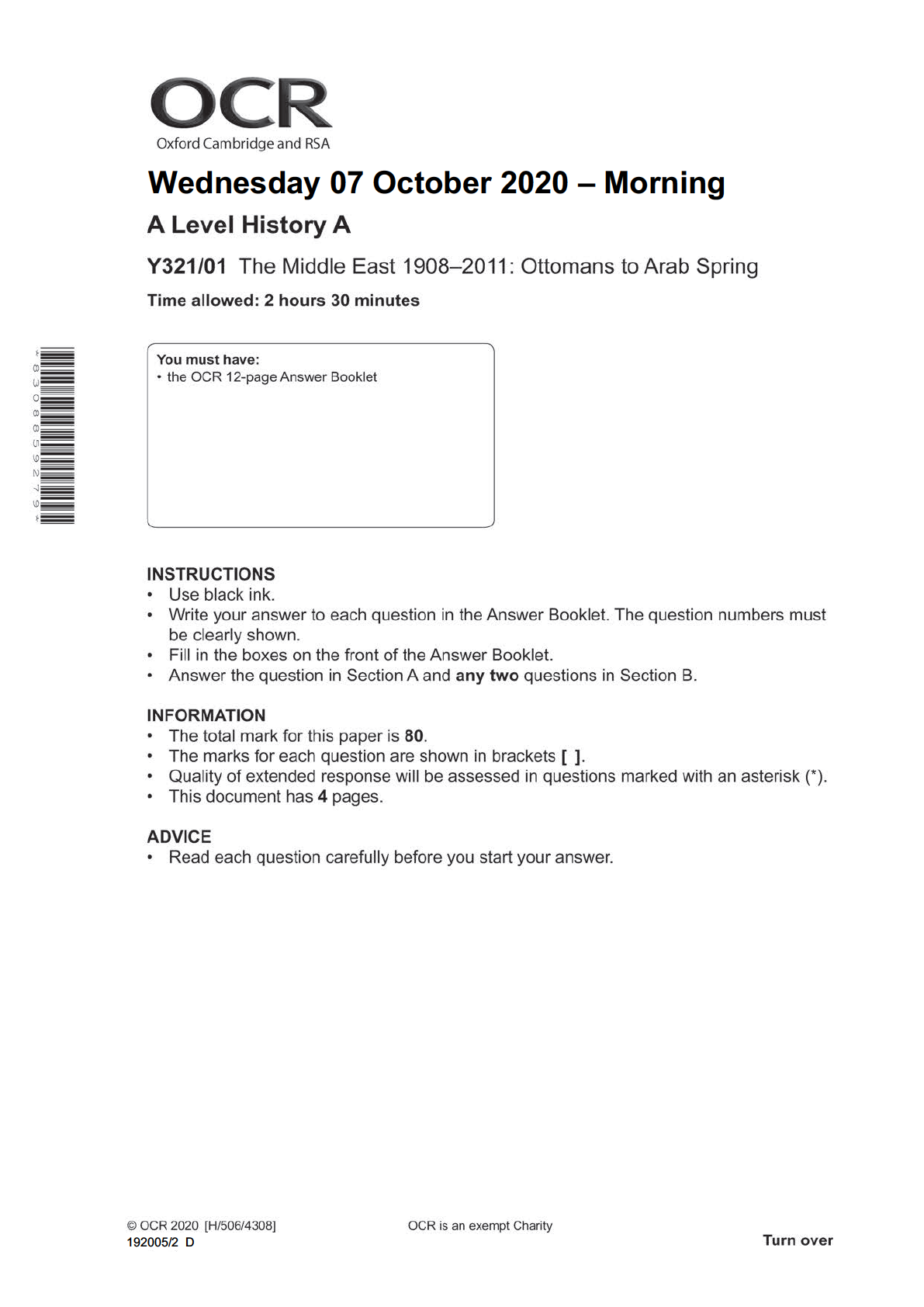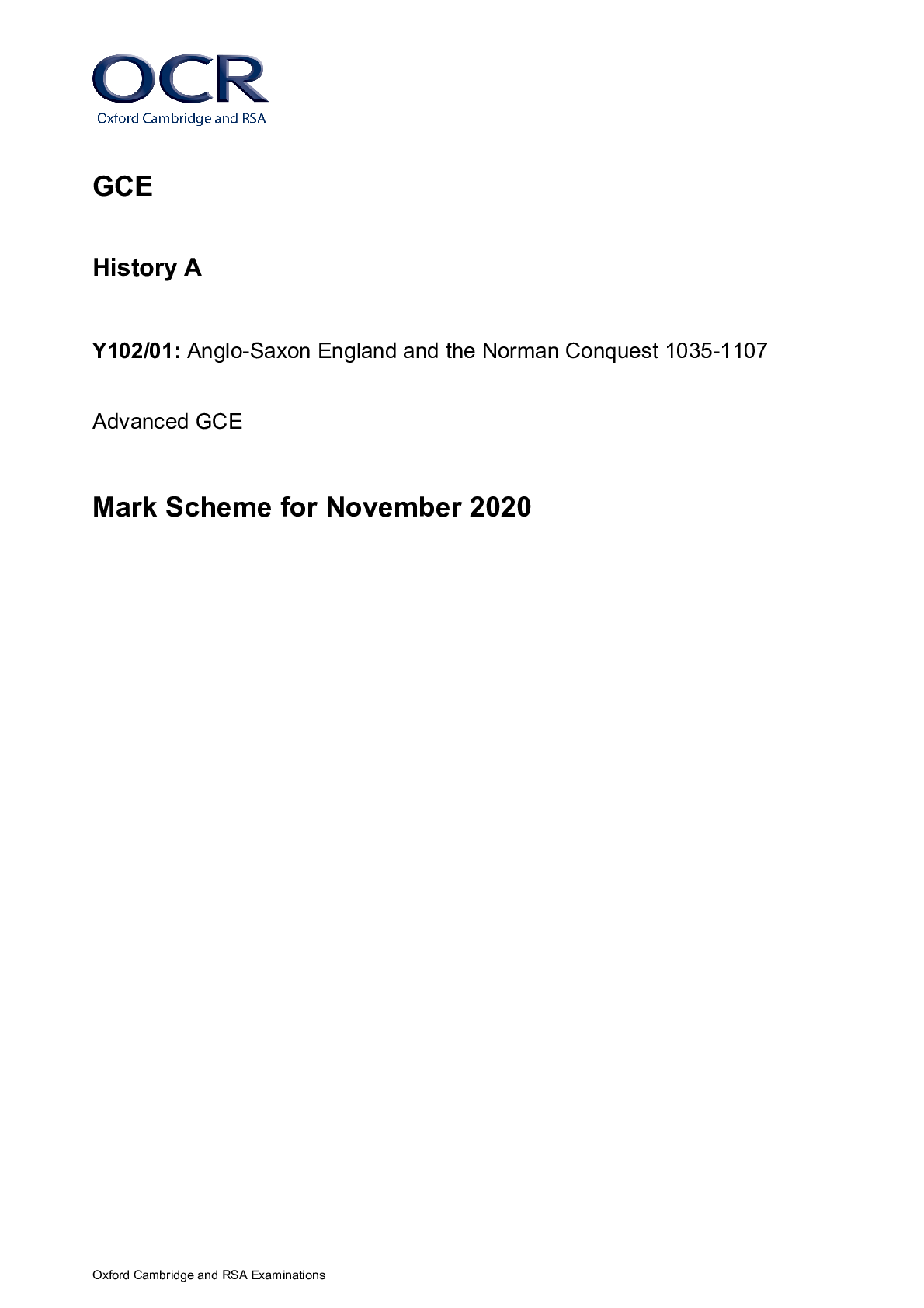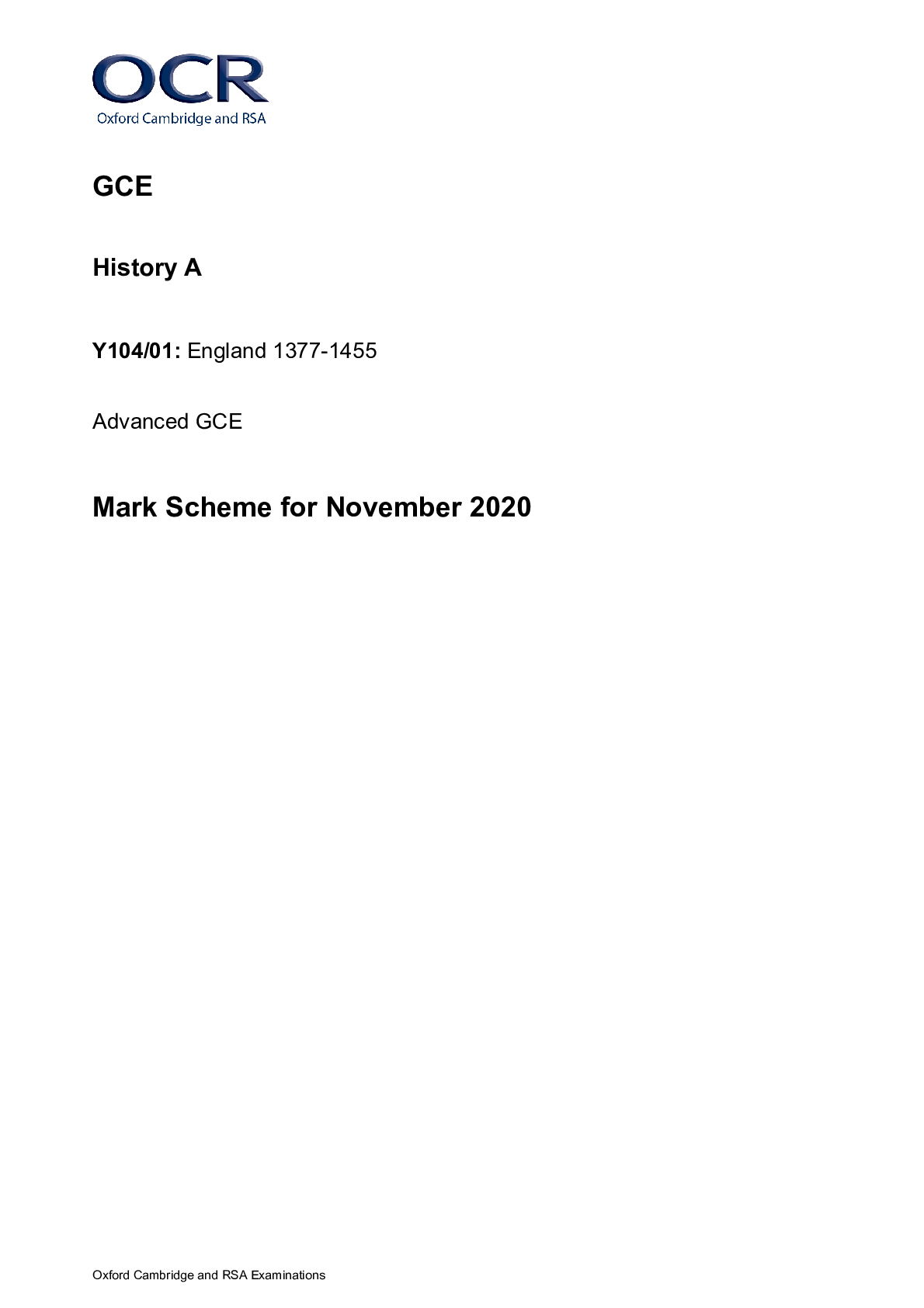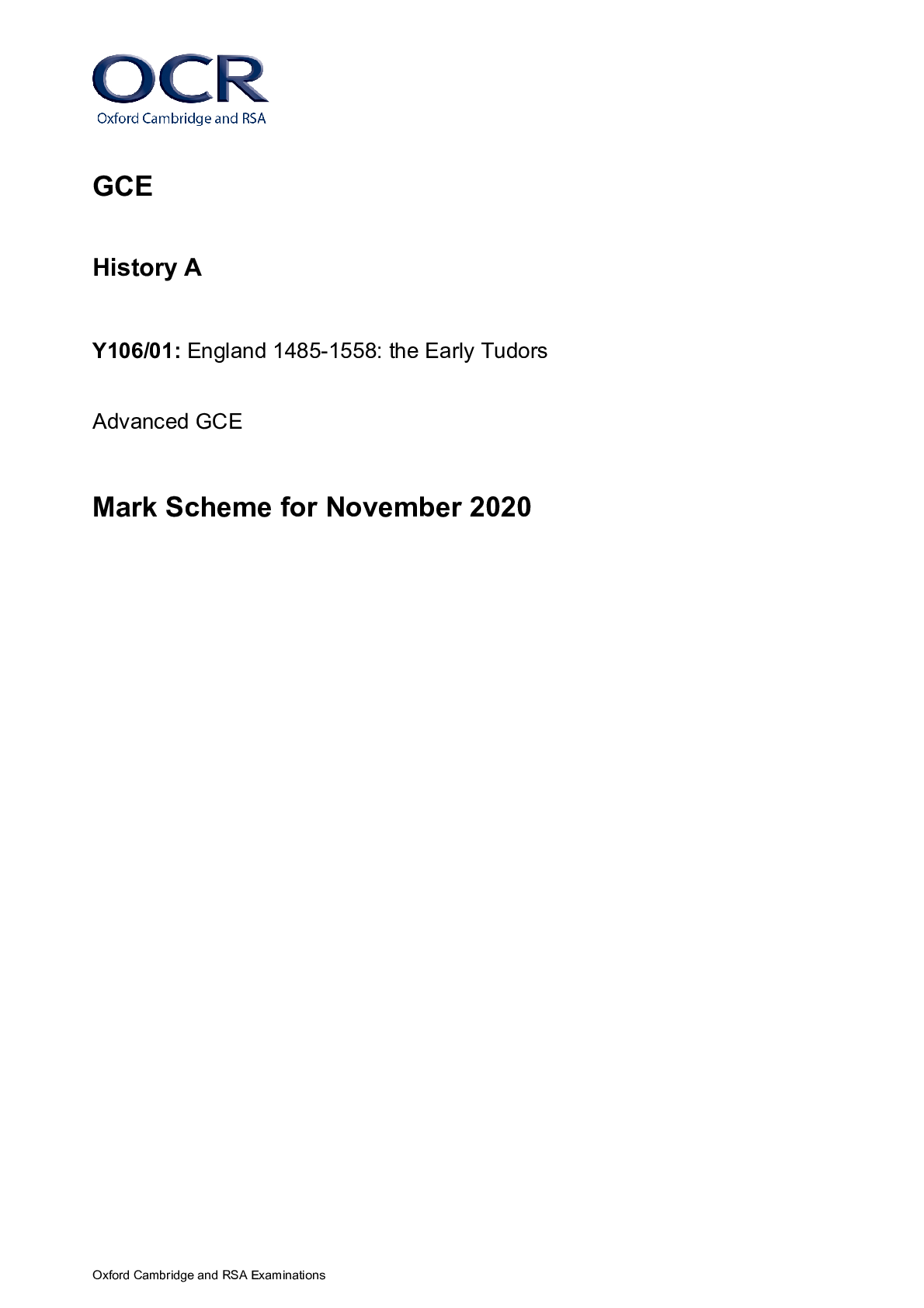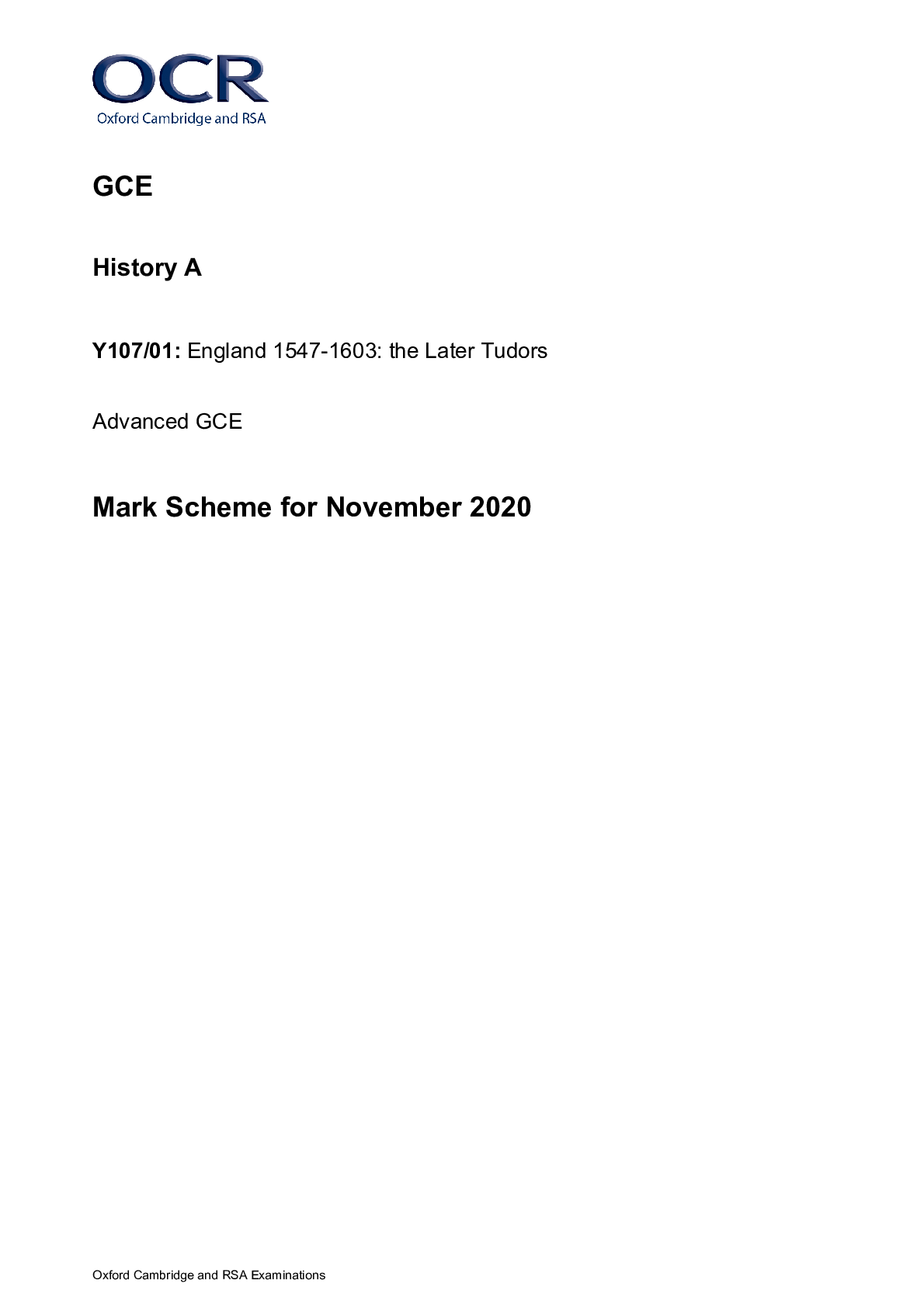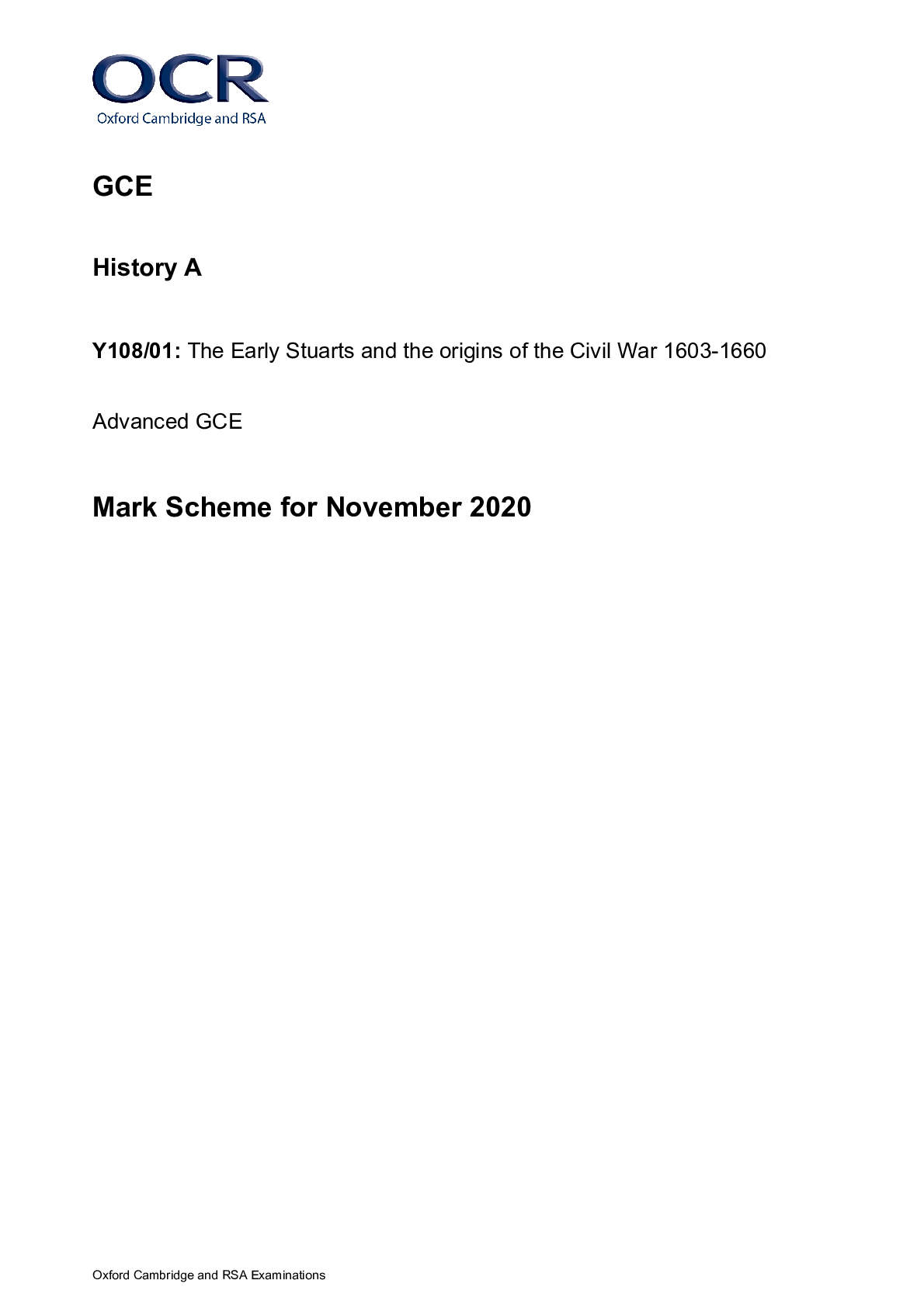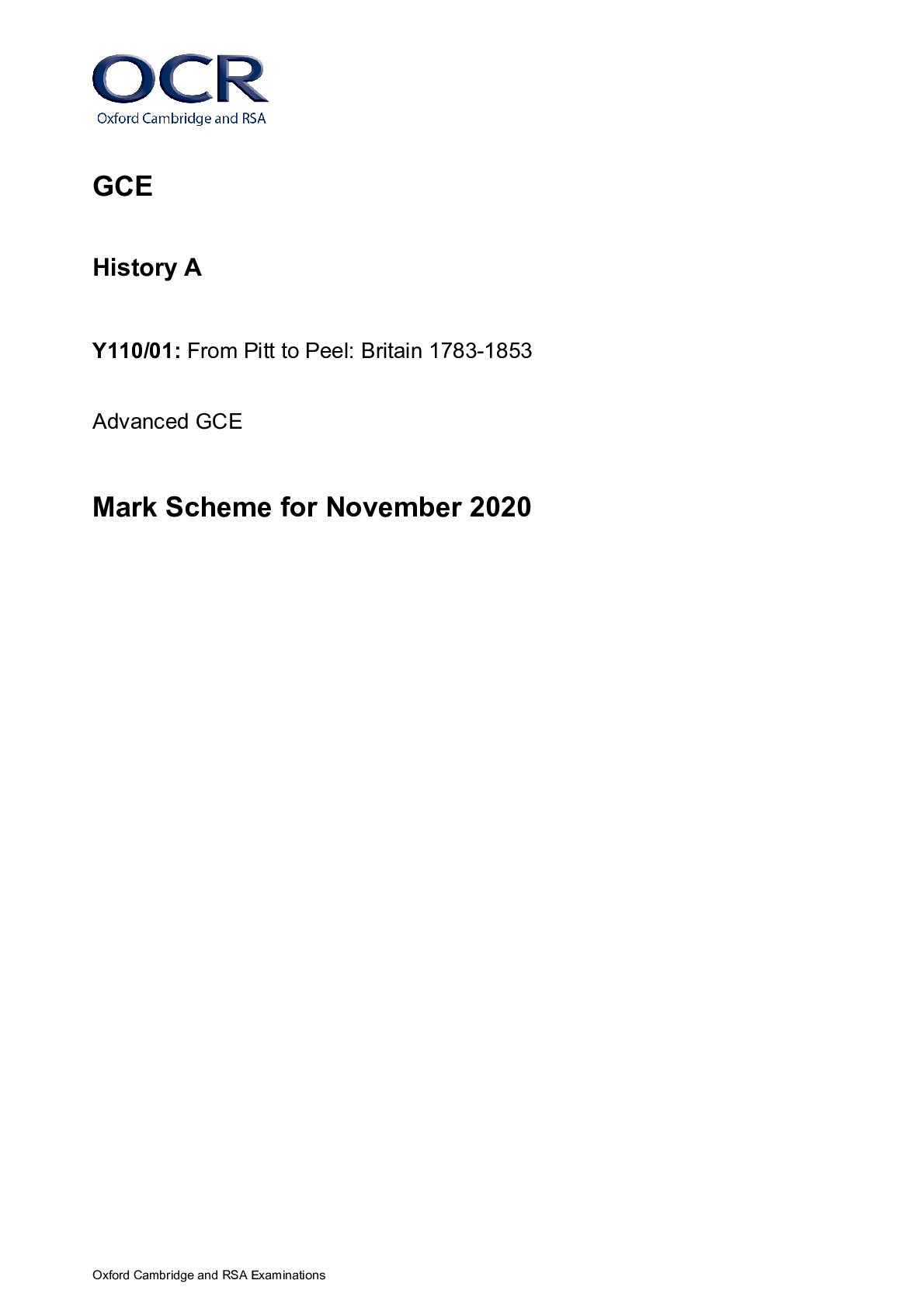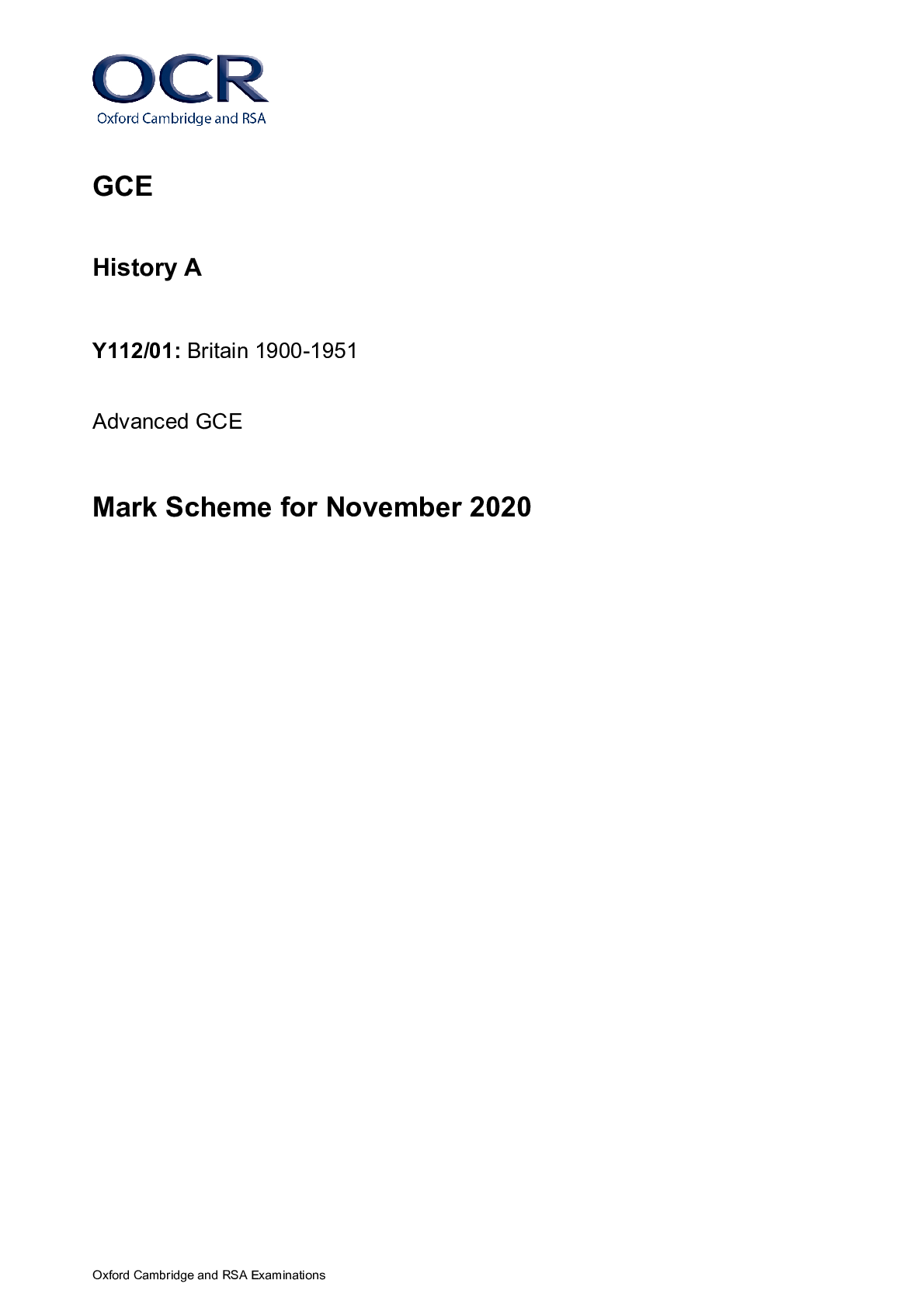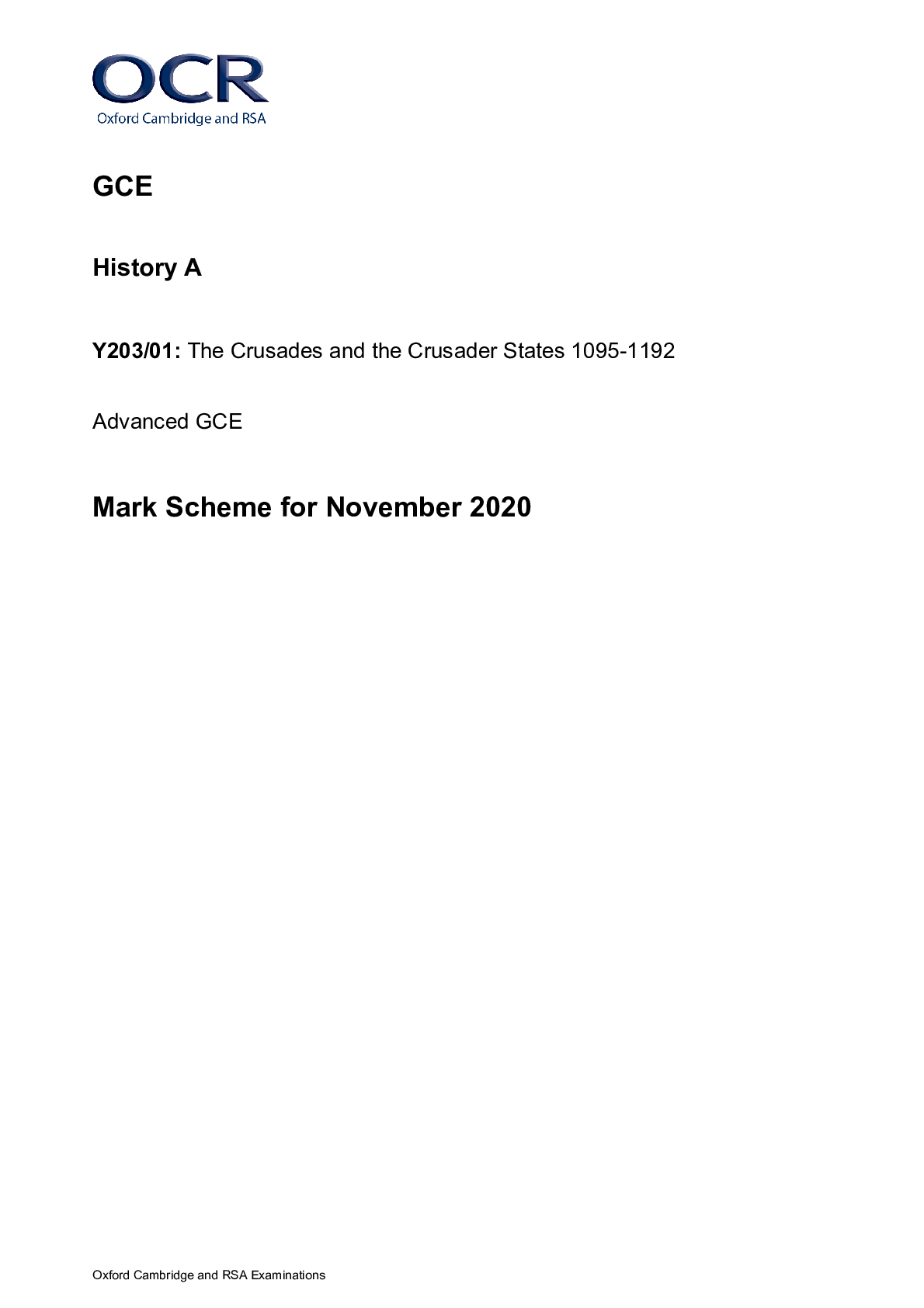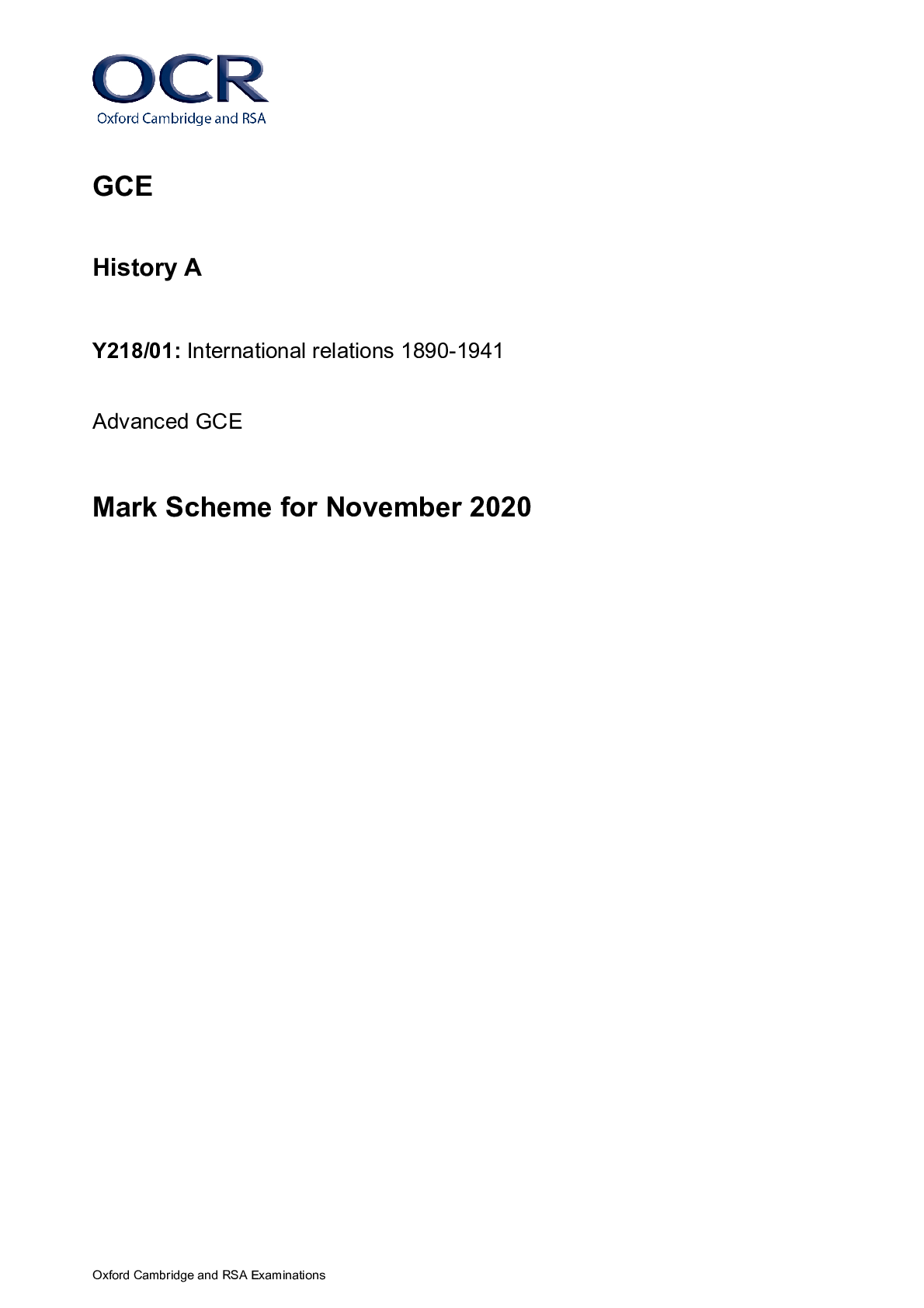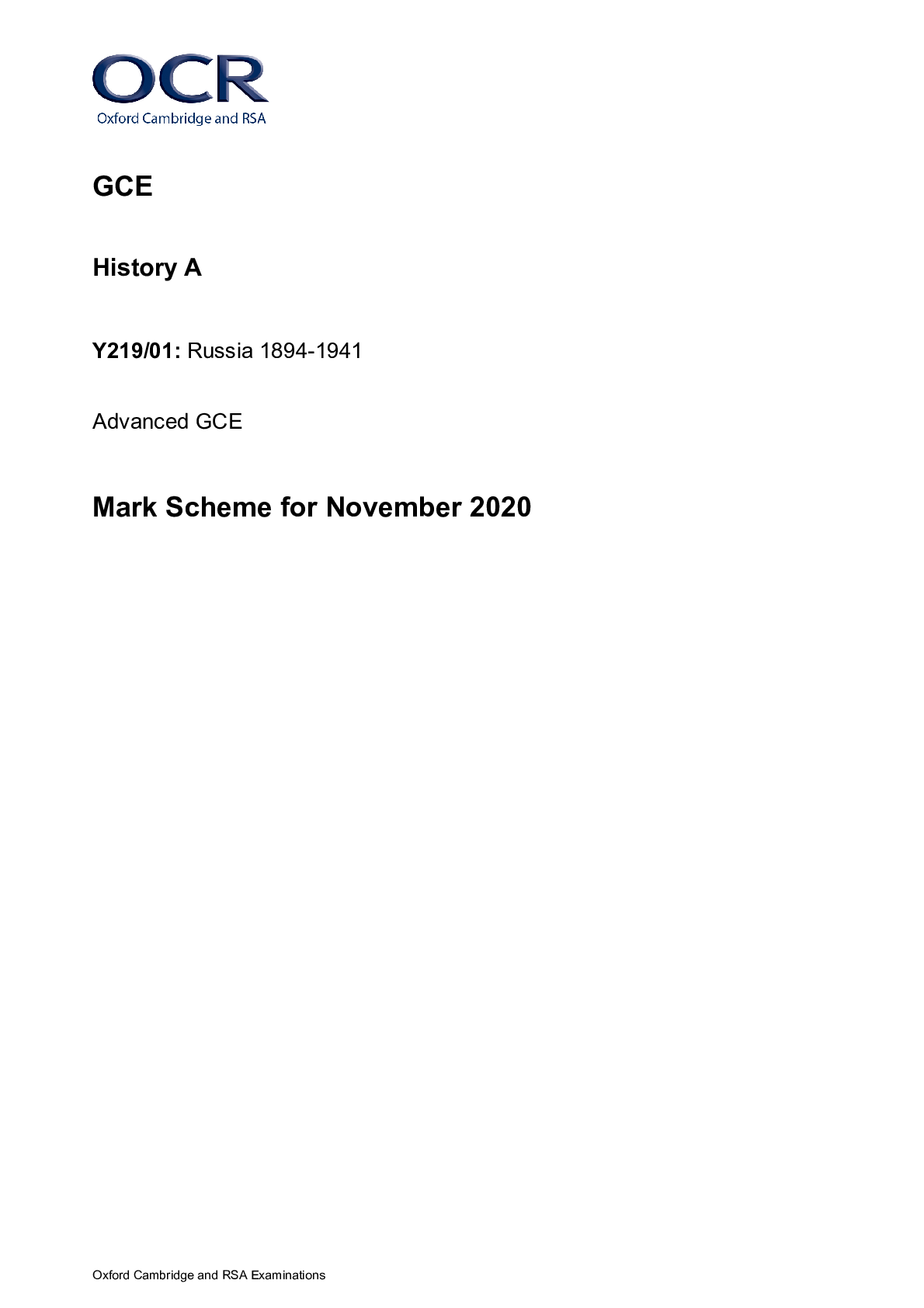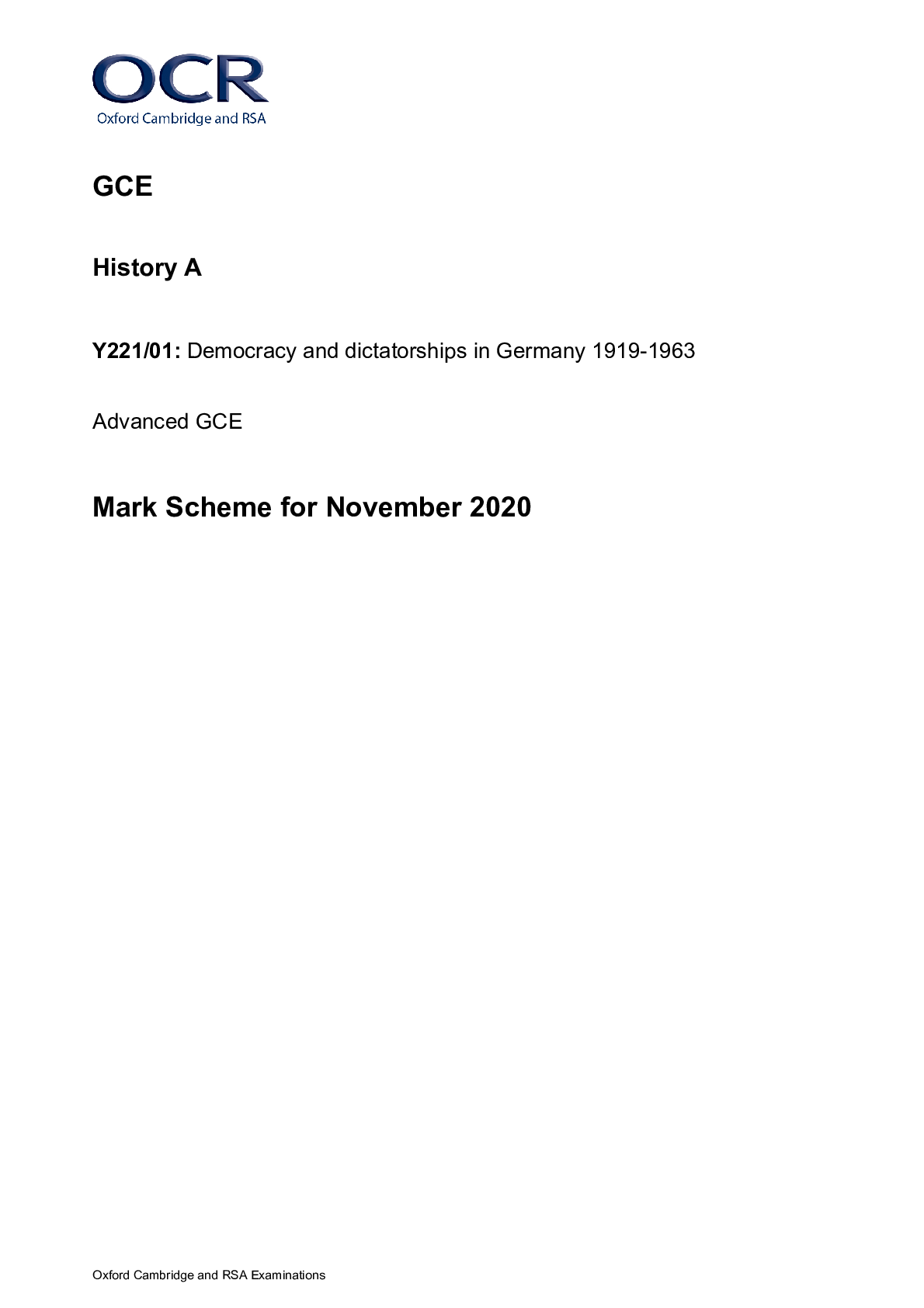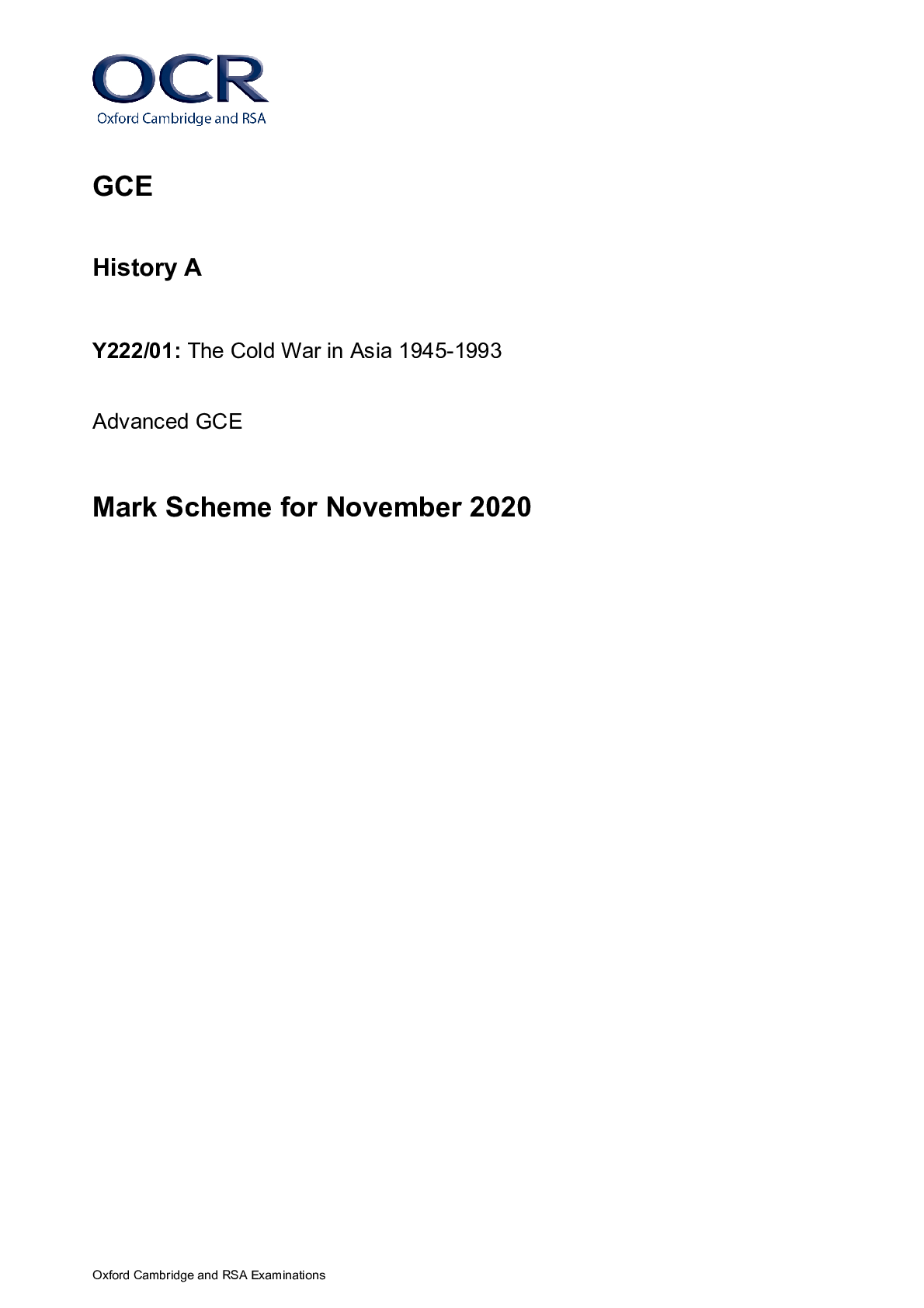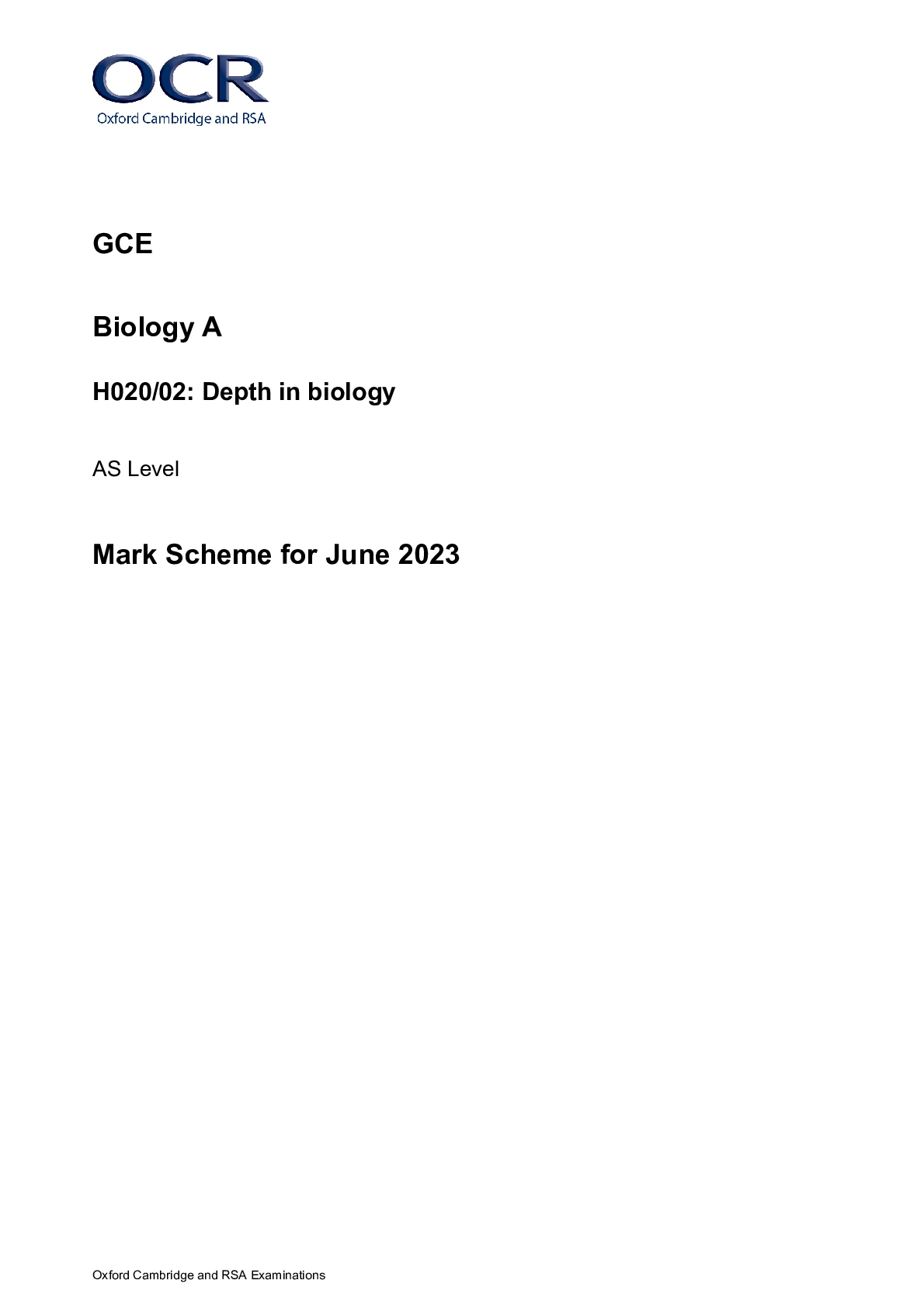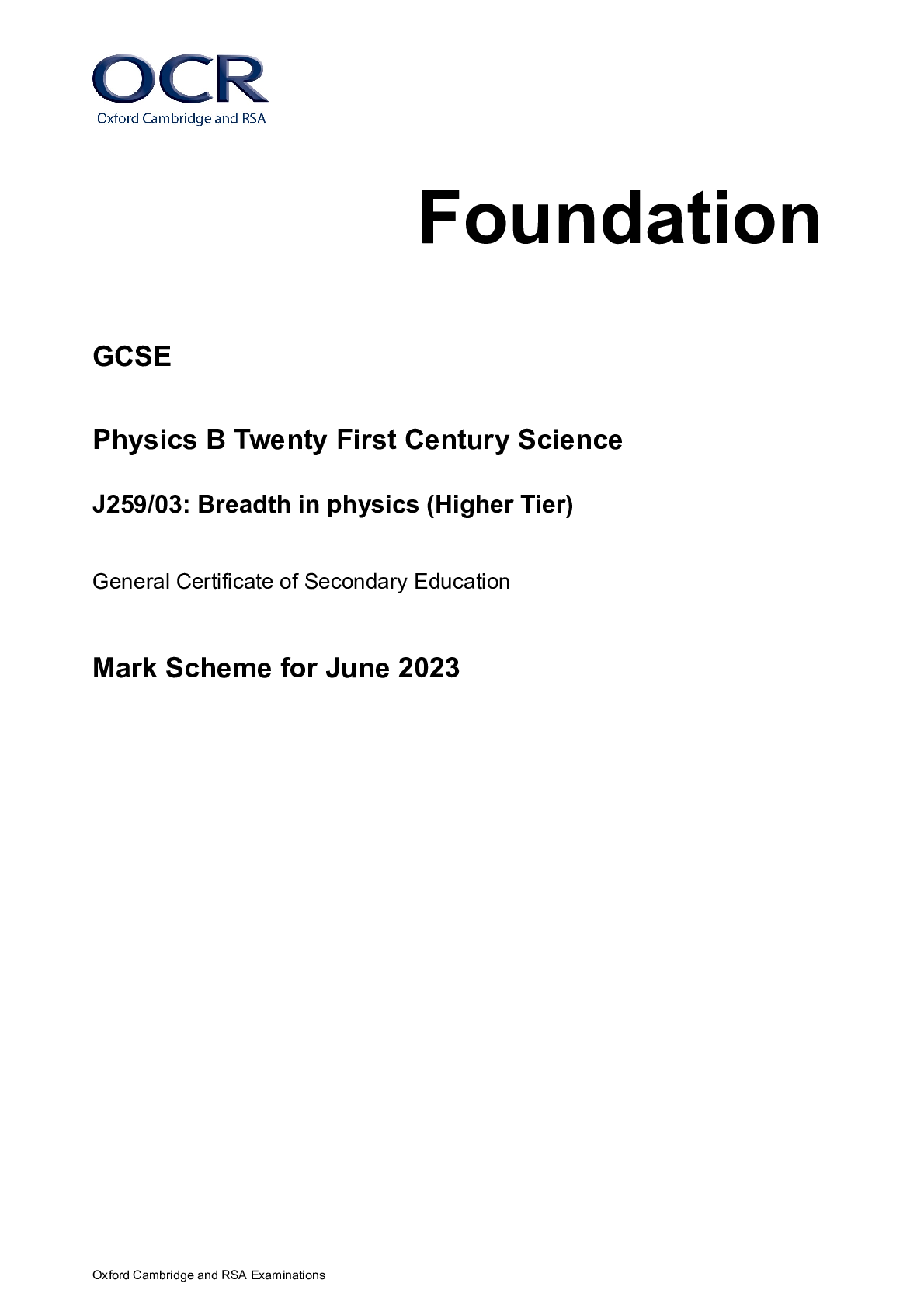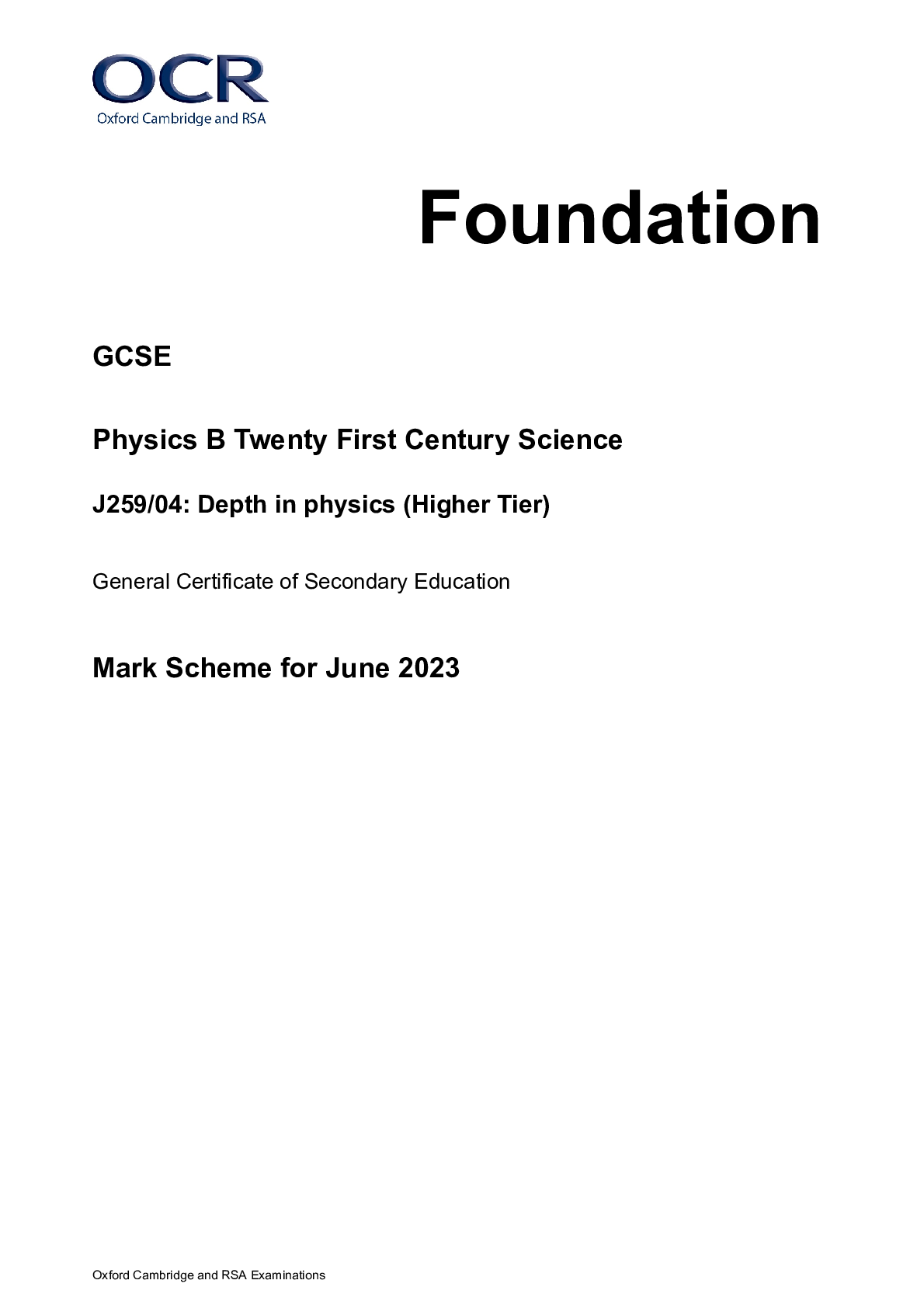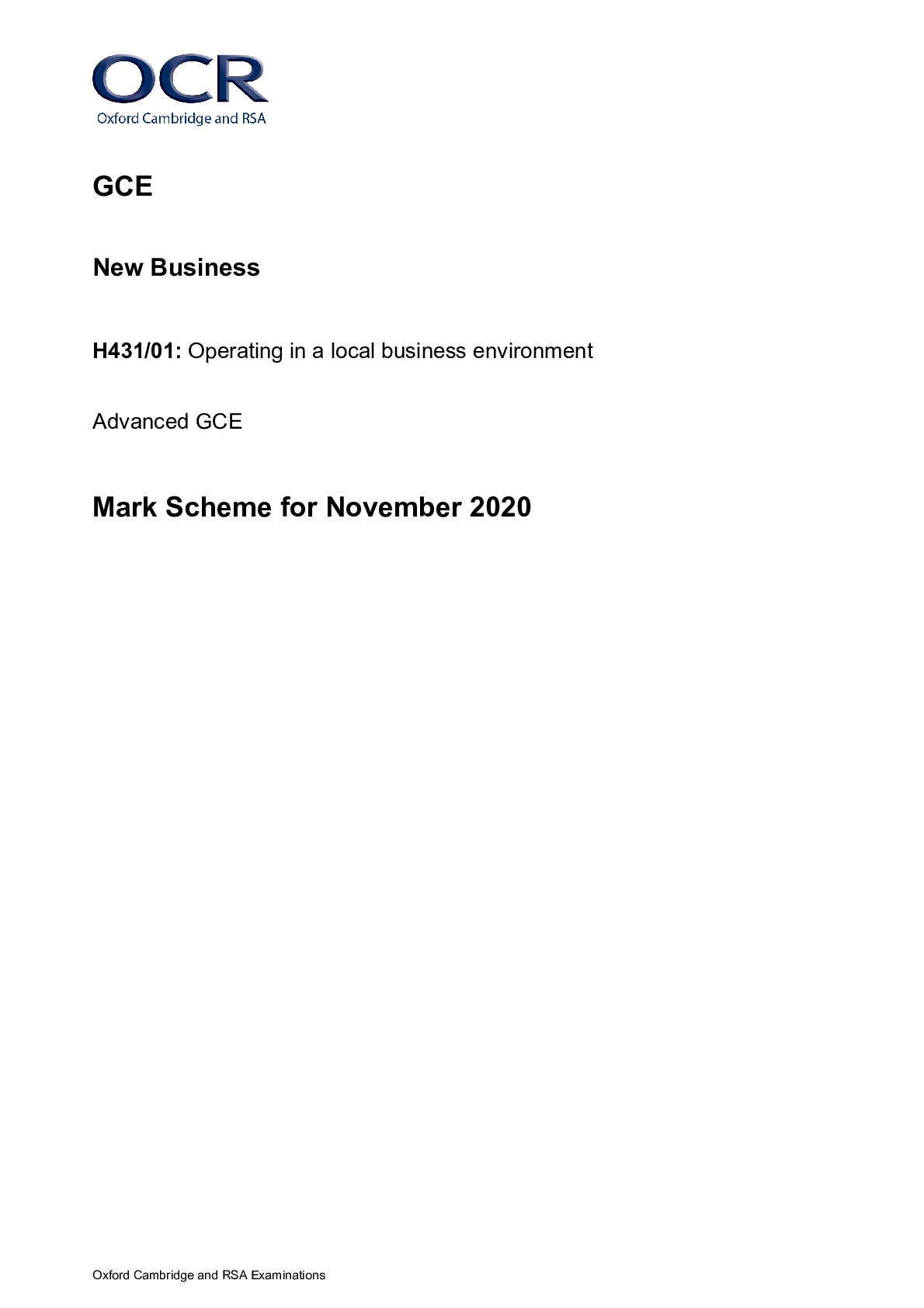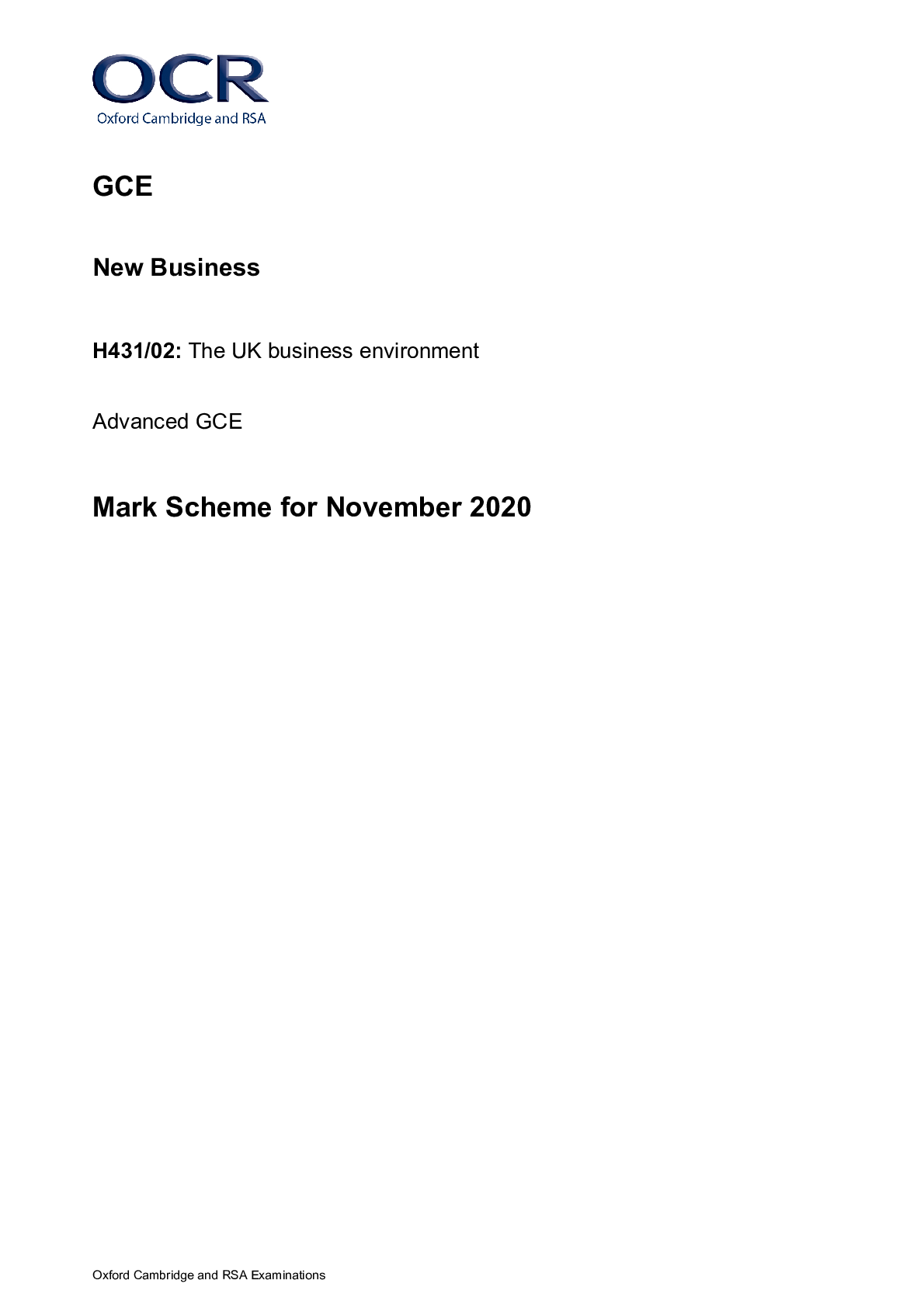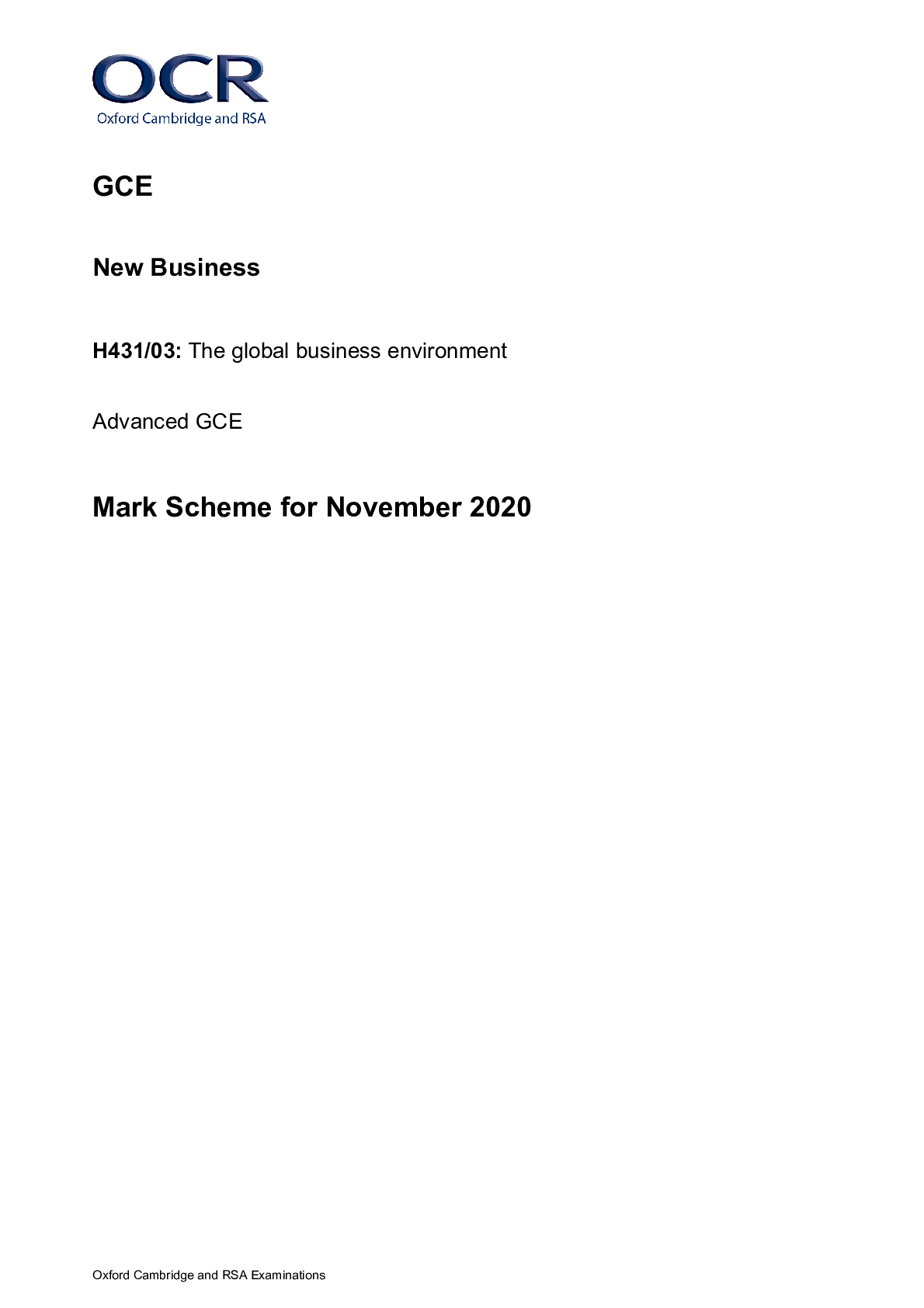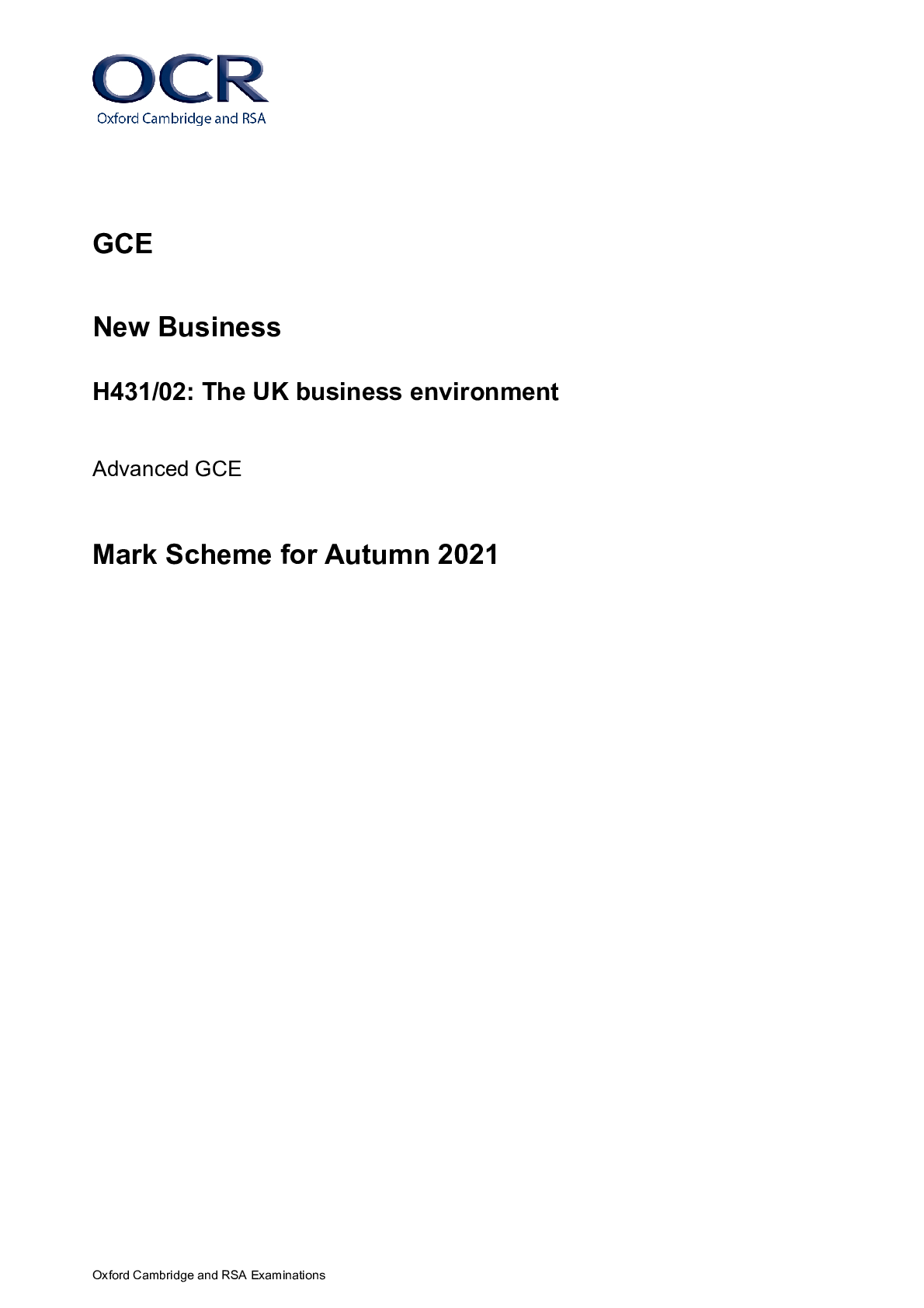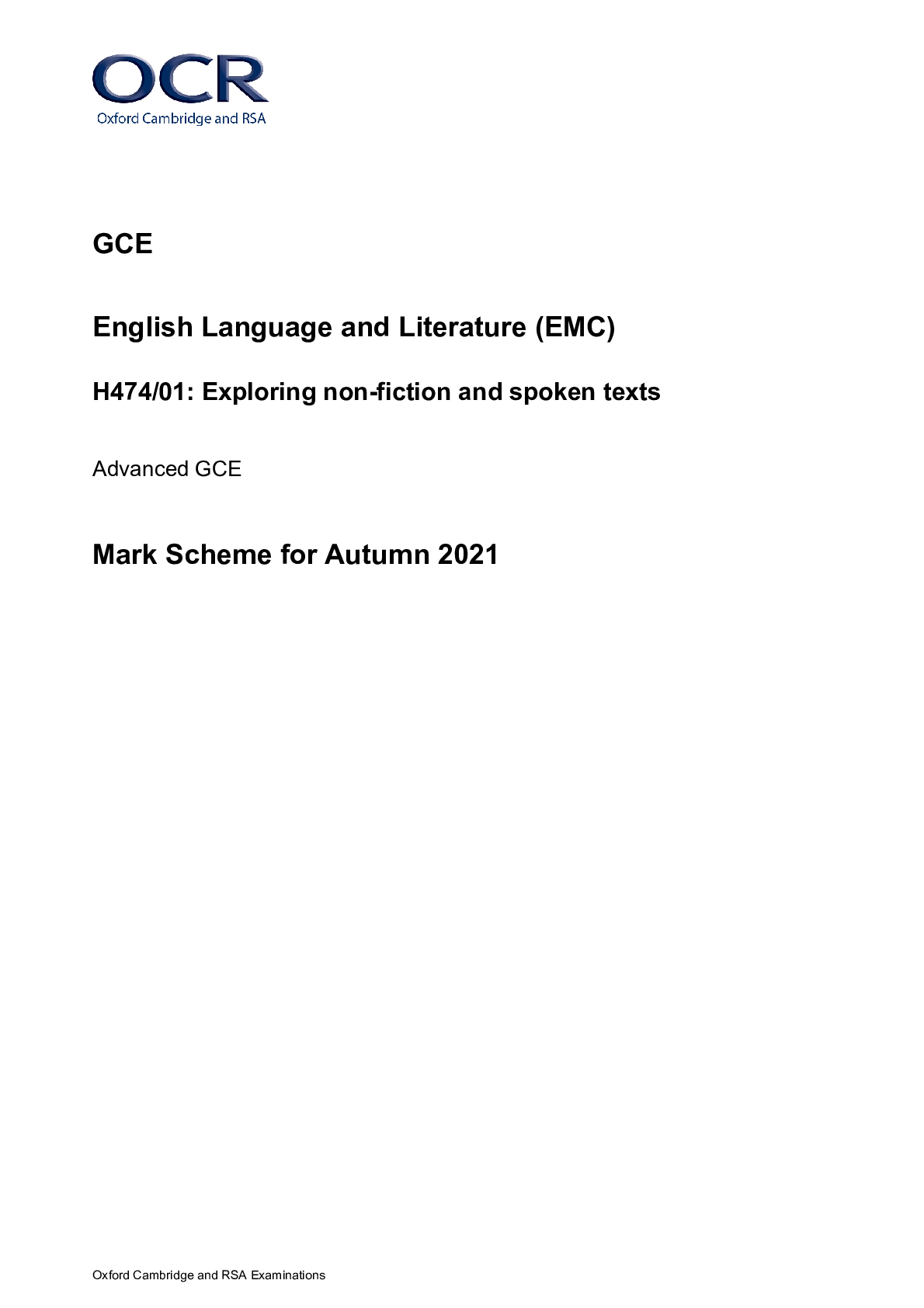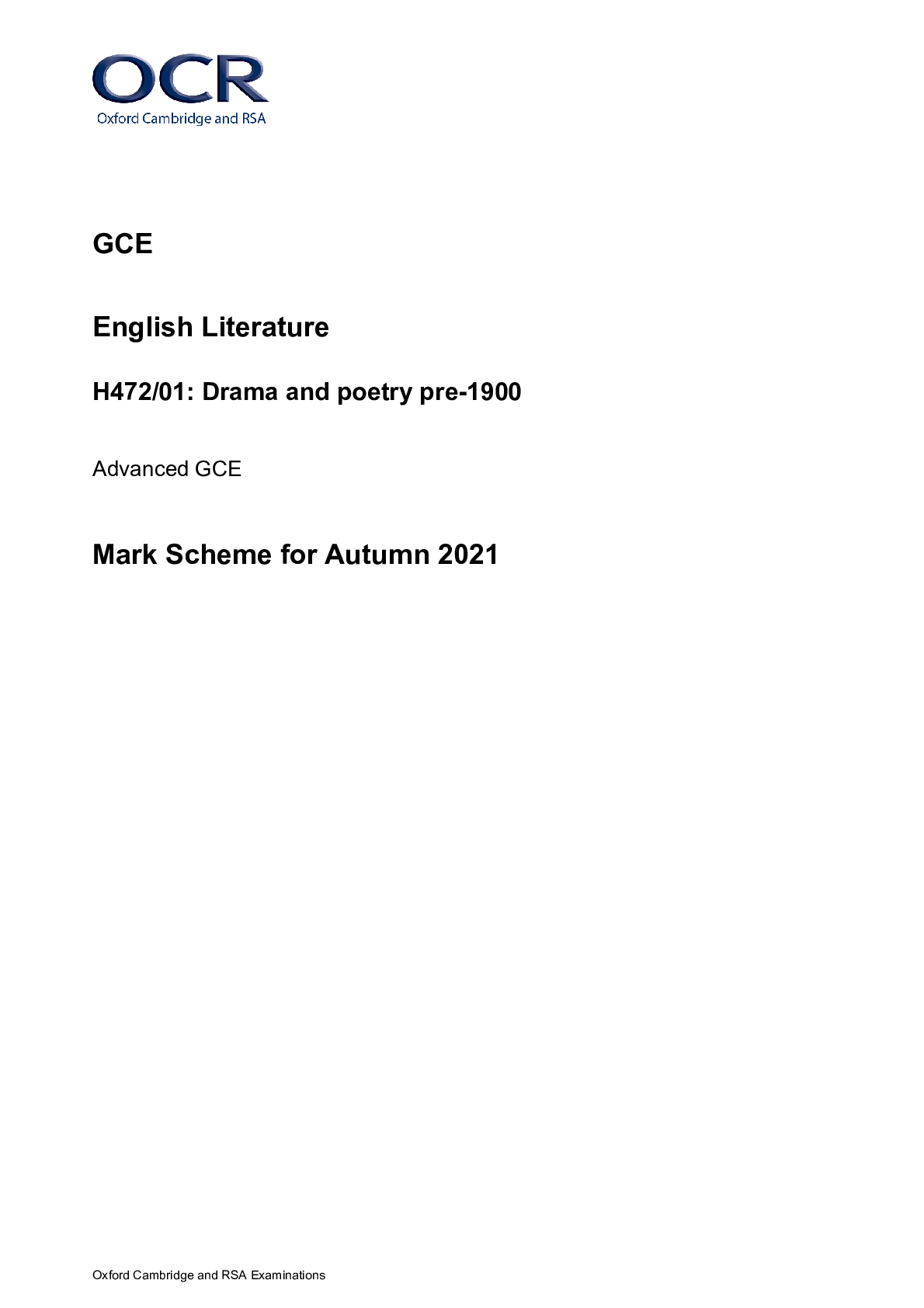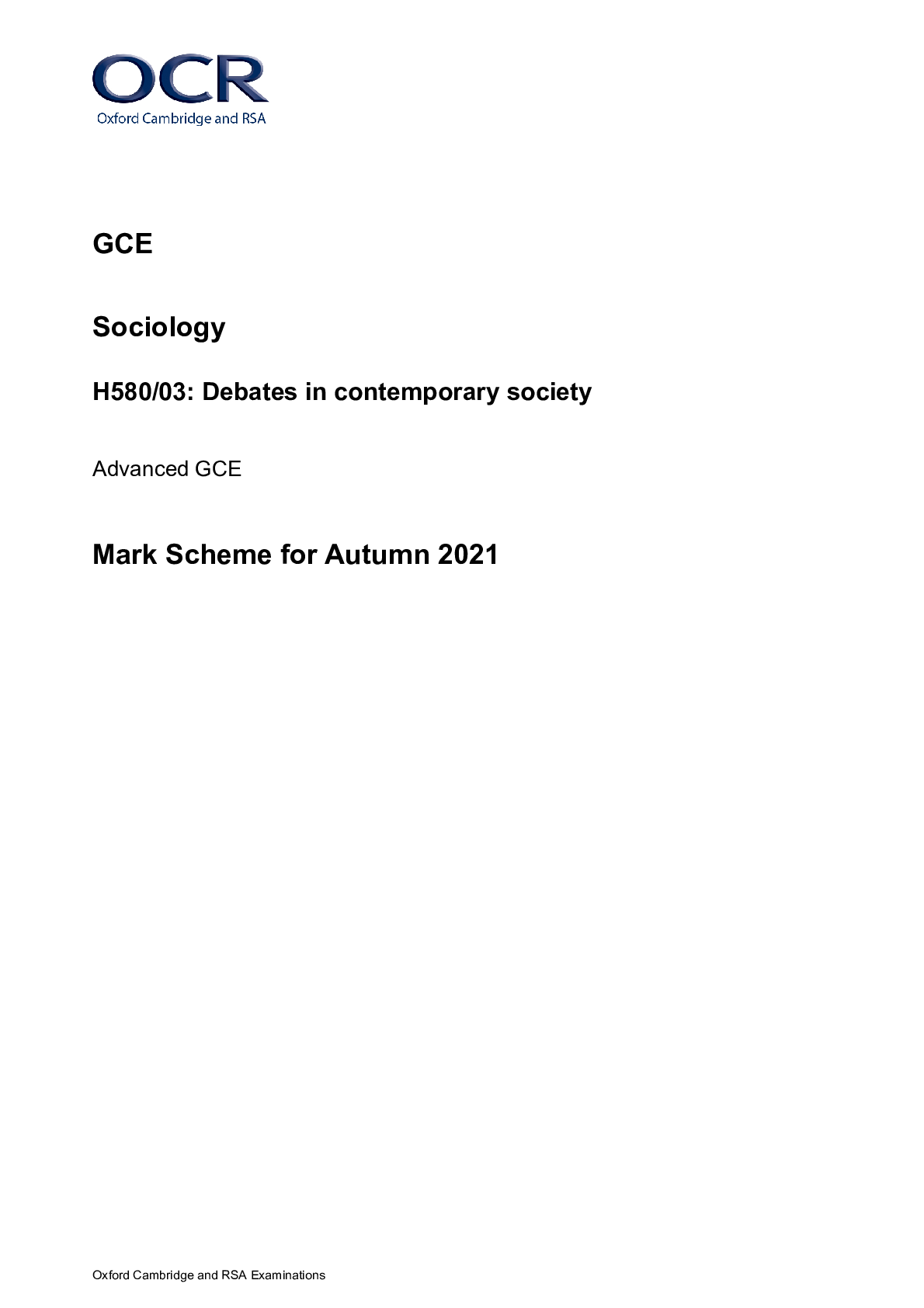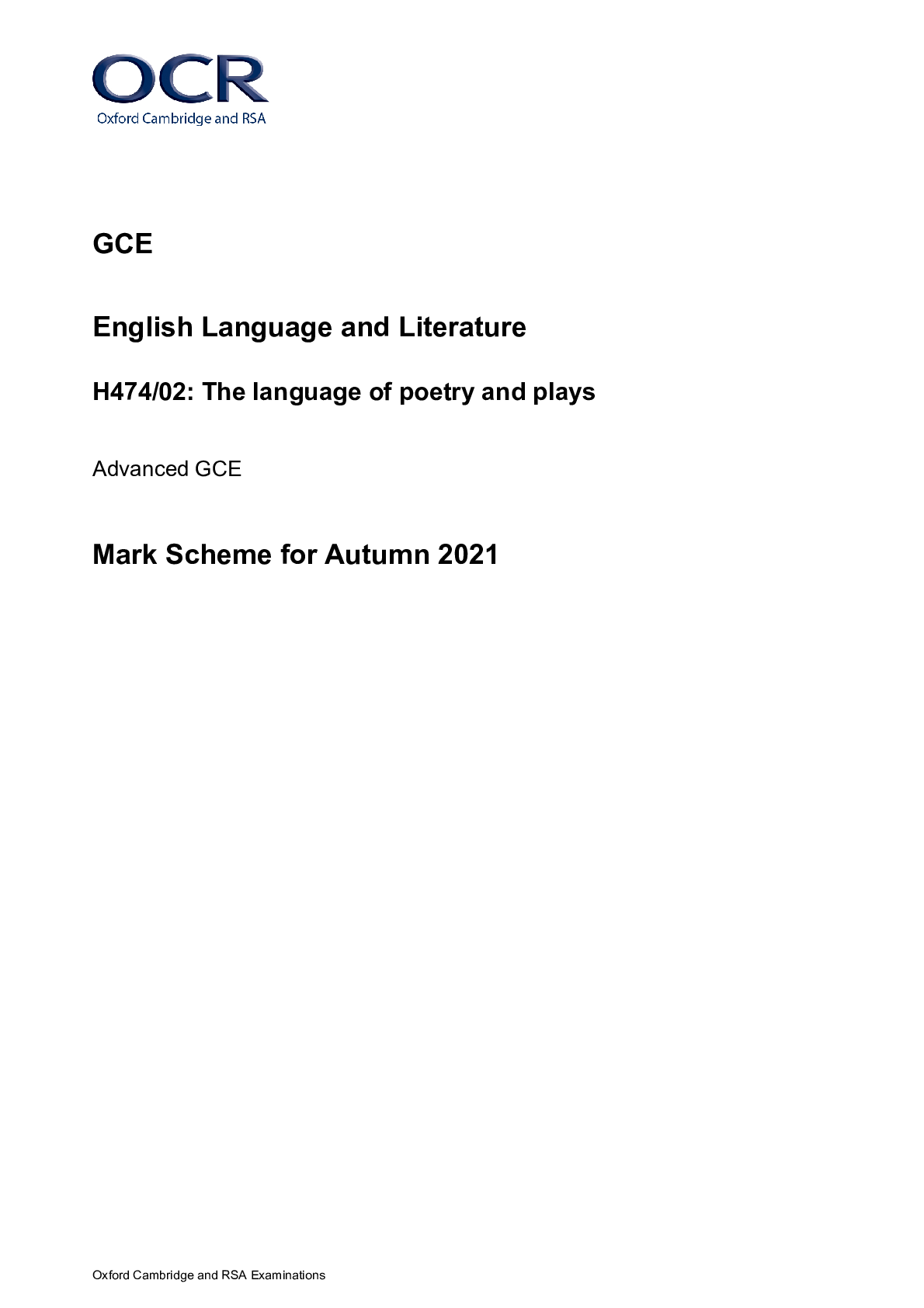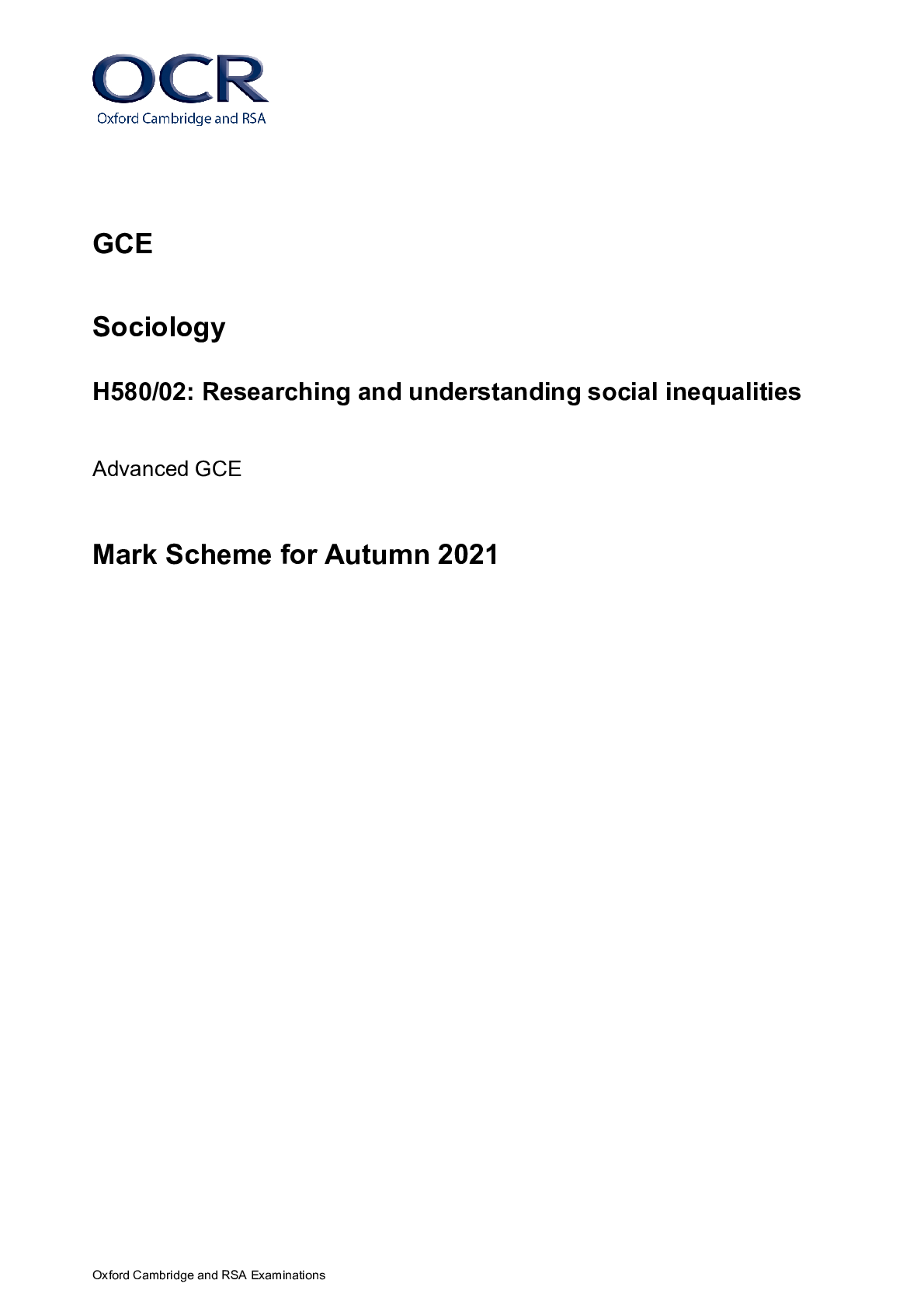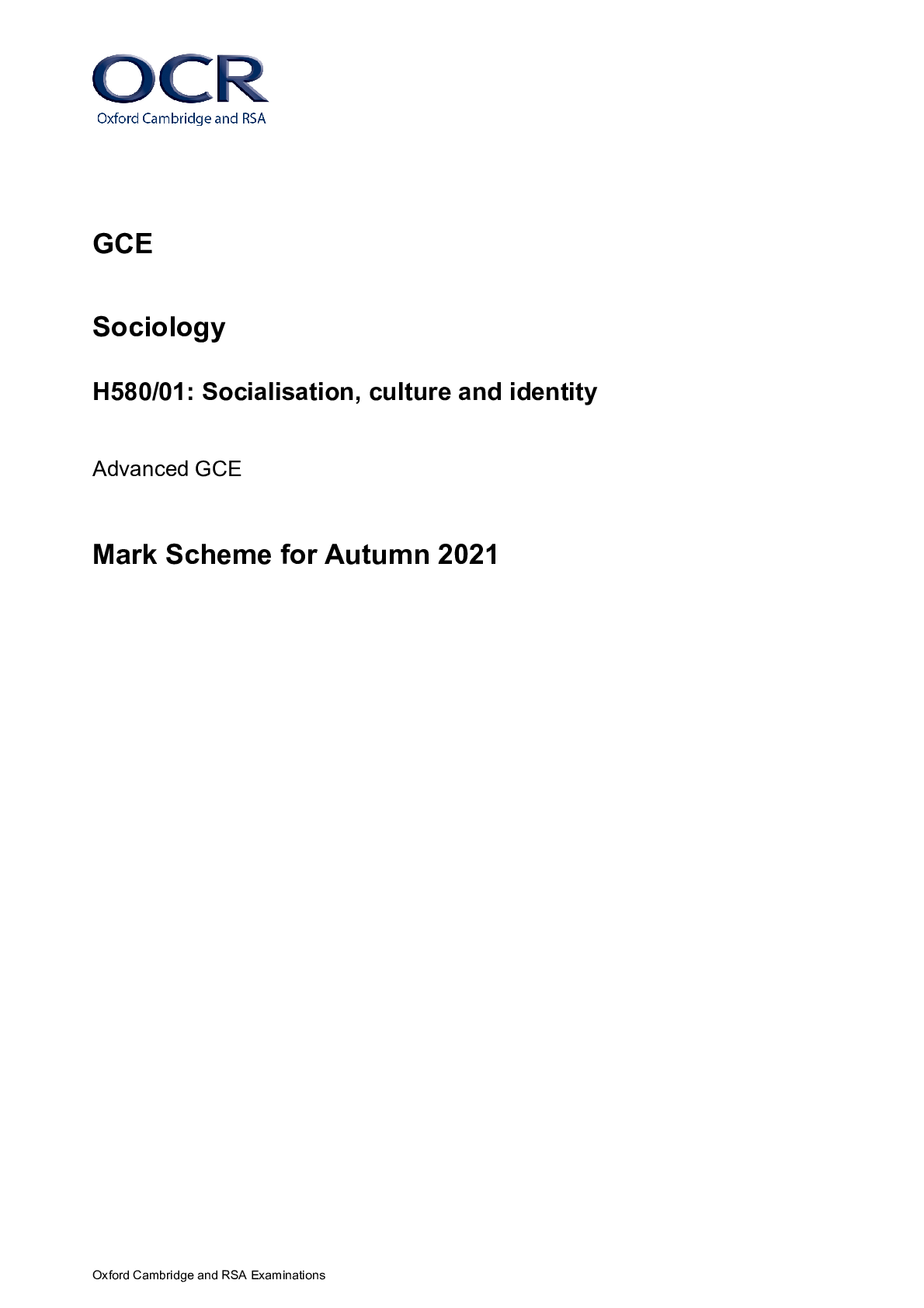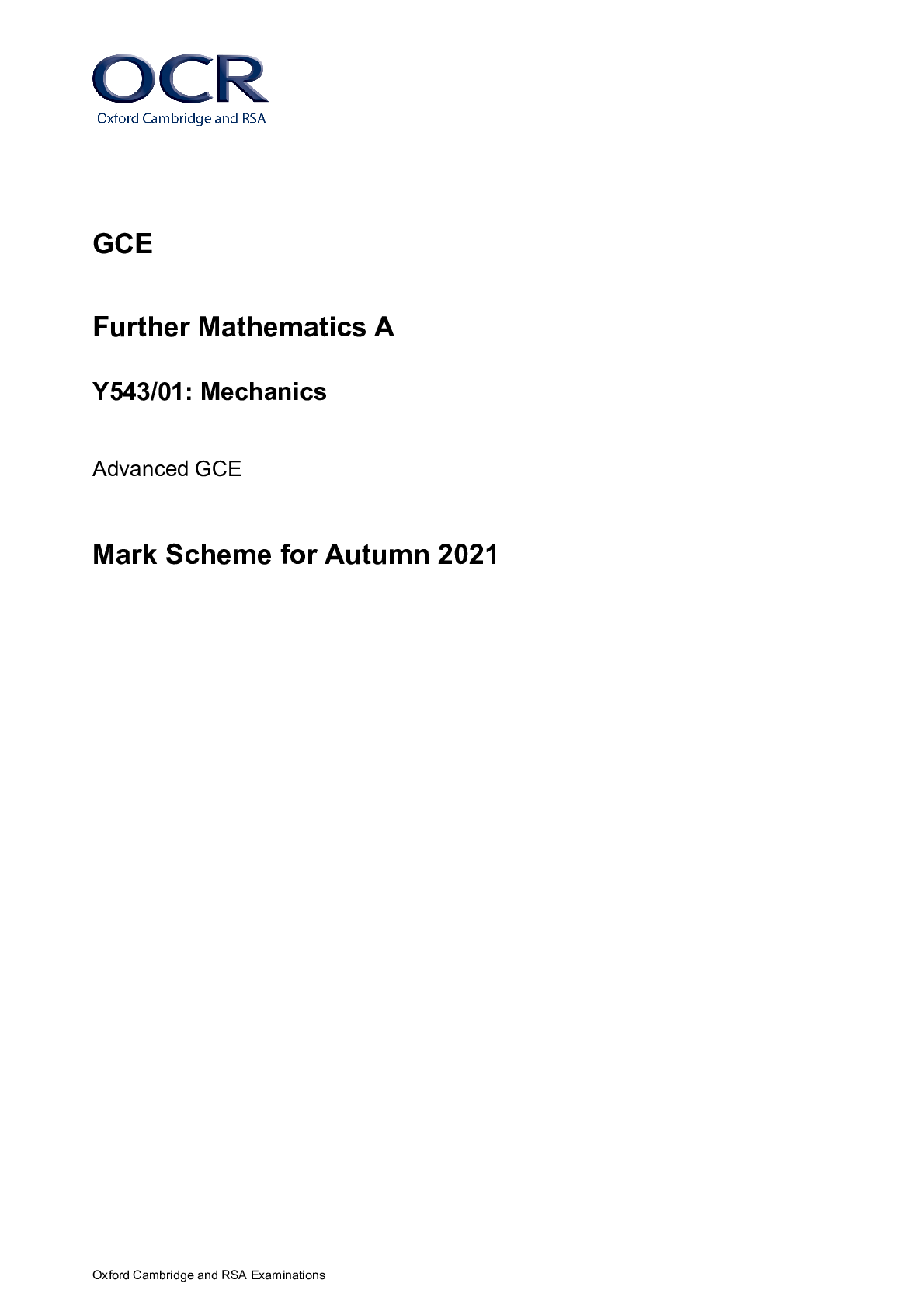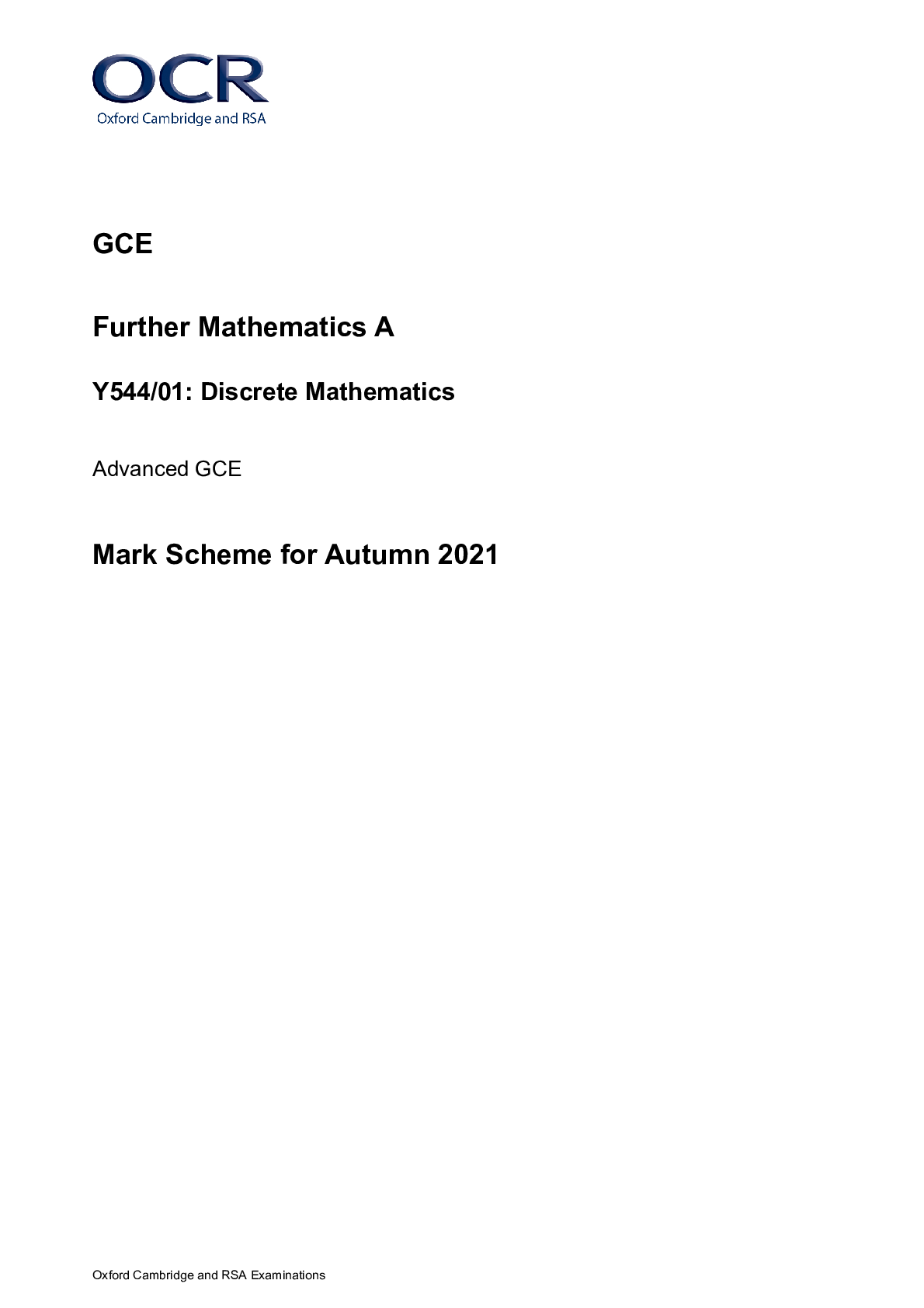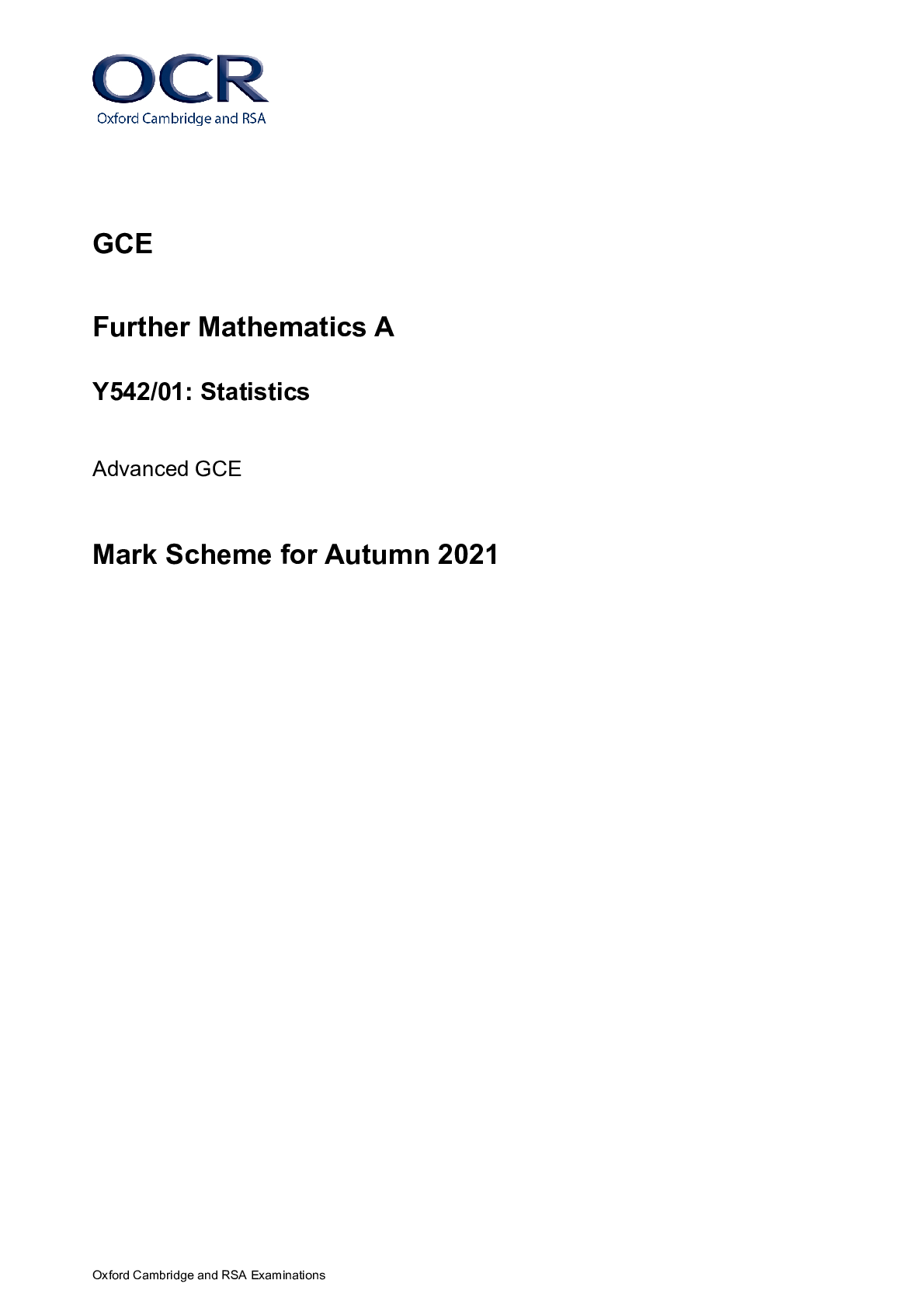History > MARK SCHEME > GCE History A Y220/01: Italy 1896-1943 Advanced GCE Mark Scheme for November 2020 (All)
GCE History A Y220/01: Italy 1896-1943 Advanced GCE Mark Scheme for November 2020
Document Content and Description Below
GCE History A Y220/01: Italy 1896-1943 Advanced GCE Mark Scheme for November 2020 Oxford Cambridge and RSA Examinations GCE History A Y220/01: Italy 1896-1943 Advanced GCE Mark Scheme for ... November 2020Oxford Cambridge and RSA Examinations OCR (Oxford Cambridge and RSA) is a leading UK awarding body, providing a wide range of qualifications to meet the needs of candidates of all ages and abilities. OCR qualifications include AS/A Levels, Diplomas, GCSEs, Cambridge Nationals, Cambridge Technicals, Functional Skills, Key Skills, Entry Level qualifications, NVQs and vocational qualifications in areas such as IT, business, languages, teaching/training, administration and secretarial skills. It is also responsible for developing new specifications to meet national requirements and the needs of students and teachers. OCR is a not-for-profit organisation; any surplus made is invested back into the establishment to help towards the development of qualifications and support, which keep pace with the changing needs of today’s society. This mark scheme is published as an aid to teachers and students, to indicate the requirements of the examination. It shows the basis on which marks were awarded by examiners. It does not indicate the details of the discussions which took place at an examiners’ meeting before marking commenced. All examiners are instructed that alternative correct answers and unexpected approaches in candidates’ scripts must be given marks that fairly reflect the relevant knowledge and skills demonstrated. Mark schemes should be read in conjunction with the published question papers and the report on the examination. © OCR 2020Unit Y220/01 Mark Scheme October 2020 Annotations Annotation Meaning of annotation Blank Page Highlight Off-page comment Assertion Analysis Evaluation Explanation Factor Illustrates/Describes Irrelevant, a significant amount of material that does not answer the question Judgement Knowledge and understanding Provenance Simple comment Unclear ViewUnit Y220/01 Mark Scheme October 2020 Question Answer Mark Guidance 1 Which was the greater success for Fascist Italy during the years from 1925 to 1939? (i) Propaganda (ii) Relations with the Church Explain your answer with reference to both (i) and (ii). • In arguing propaganda was the greater success, answers might consider the ‘Cult of Il Duce’ and the length of Mussolini’s tenure of power which this secured. • Answers might consider the lack of meaningful opposition to Mussolini during these years. • Answers might consider the role of propaganda in fascist control of education as well as in youth movements and the Dopolavoro. • Answers might consider the role of propaganda in obscuring foreign policy failures and exaggerating its successes. • Answers might consider the failure of propaganda in promoting support for anti-Jewish measures. • In arguing relations with the Church were the greater success, answers might consider that, since its creation, the Kingdom of Italy had suffered a fundamental division between state and church and that this was only resolved by Mussolini, whose achievement, moreover, remains in place to this day. • Answers might consider the importance of Catholic support in attracting supporters to Fascism. 10 • No set answer is expected. • Judgement must be supported by relevant and accurate material. • Only credit material relevant to ‘the greater success for Fascist Italy’. • Answers may deal with each factor in turn, then compare them to reach a judgement, or make a continually comparative approach. Either approach is acceptable. • Knowledge must not be credited in isolation. It should only be credited where it is used as the basis for analysis and evaluation, in line with descriptions in the levels mark scheme.Unit Y220/01 Mark Scheme October 2020 • Answers might consider the clear limits to cooperation between Mussolini and the Church demonstrated by the clash over ‘Catholic Action’ in 1931. • Answers might consider the opposition from Pius XI to the introduction of anti-Semitic measures. • Answers might consider the influence of the ‘L”Osservatore Romano’. 1 (b) * ‘Mussolini’s political ability explains his success during the years from 1915 to 1925.’ How far do you agree? • In arguing Mussolini’s success was determined by his own ability, answers might consider that Mussolini was careful to stand apart from the Fascist Party, almost from its inception, and to pursue a path calculated to appeal to all. • Answers might also consider the effect of his personal ability in matters such as oratory, propaganda and journalism. • Answers might consider Mussolini’s success in claiming credit for initiatives for which he had not been responsible such as the emergence of the squadristi. • Answers might consider his skilful manipulation of his opponents. • Answers might consider his equally skilful response to the Giolitti Crisis. 20 • No set answer is expected. • At higher levels candidates will focus on ‘how far do you agree’, but at level 4 may simply list reasons. • At level 5 and above there will be judgement as to the relative importance of different reasons. • At higher levels candidates might establish criteria against which to assess the different reasons. • To be valid judgements, claims must be supported by relevant and accurate material. If not, they are assertions. • Knowledge must not be credited in isolation; it should only be credited where it is used as the basis for analysis andUnit Y220/01 Mark Scheme October 2020 • Answers might consider his refusal to be bound by dogma, in for example, the accommodation he reached with the Southern élites. • Answers might consider his personal understanding that accommodation should be reached with both the Monarchy and the Papacy, despite Fascism’s initial opposition to both. • Answers might consider his skilful control of the Fascist Party following his rise to power by, for example, the creation of the Fascist Militia and the Fascist Grand Council. • In arguing Mussolini’s success was not determined principally by his own abilities, answers might consider the long-term weaknesses of Liberal Italy which aided his rise to power both to the Prime Ministership and to dictatorship. • Answers might consider the effects of World War One On Italy. • Answers might consider the fear of Communism in Italy which Mussolini was able to manipulate. • Answers might consider the effects of the mistakes of Mussolini’s opponents such as Giolitti, Sturzo and Facta. evaluation, in line with descriptions in the levels mark scheme.Unit Y220/01 Mark Scheme October 2020 • Answers might consider the crucial role played by Victor Emmanuel III in Mussolini’s success. • Answers might consider the effect of simple good fortune on Mussolini’s rise. For example, the general improvement in the postwar European economy happened to coincide with his assumption of power.Unit Y220/01 Mark Scheme October 2020 Question Answer Mark Guidance 2 (a) Which was the greater failure for Italy during the years from 1896 to 1915? (i) Domestic policy (ii) Foreign policy Explain your answer with reference to both (i) and (ii). • In arguing domestic policy provided the greater failure, answers might consider that the problems of ‘trasformismo’ and the failure to establish a properly functioning party system in Italy. • Answers might consider the failure to resolve the North/South divide in Italy. • Answers might consider the growth of Socialism which, by 1914, was supported by 25% of the electorate whilst being firmly opposed to the Liberal State. • Answers might consider the clear evidence of rebellion during these years such as the assassination of King Umberto I and the general strike of 1904. • Answers might consider the withdrawal of the ban on political participation produced by the Catholic Church in 1904. • Answers might consider the improvements in both agriculture and industry brought about during these years and the 1911 reform of the electoral laws. • In arguing foreign policy provided the greater failure, answers might consider the humiliation of Italy’s attempt at taking Abyssinia and its defeat at Adowa in 1896. 10 No set answer is expected. • Judgement must be supported by relevant and accurate material. • Only credit material relevant to the ‘greater failure for Italy’. • Answers may deal with each factor in turn, then compare them to reach a judgement, or make a continually comparative approach. Either approach is acceptable. • Knowledge must not be credited in isolation. It should only be credited where it is used as the basis for analysis and evaluation, in line with descriptions in the levels mark scheme.Unit Y220/01 Mark Scheme October 2020 • Answers might consider the agreement with France made in 1902 concerning Libya and Morocco. • Answers might consider the emergence of the ‘Associazione Nazionalista Italiana’ and Enrico Corradini. • Answers might consider the successful invasion of Libya in 1911. • Answers might consider the decision to stay out of World War I in 1914. • Answers might consider the ‘Intervention Crisis’ in 1915 and its effect on Italy. 2 (b) * ‘Mussolini’s foreign policy during the years from 1922 to 1943 achieved nothing but his own downfall.’ How far do you agree? • In arguing Mussolini’s foreign policy achieved nothing but his own downfall, answers might consider that Mussolini’s foreign policy always had an inbuilt desire for war and that it was war which ultimately brought him down, despite his skilful survival of mistakes during peace time. • Answers might also consider that, despite then being in power for almost seventeen years, Mussolini’s position internationally in 1939 was arguably weaker than that of Liberal Italy in 1914. They might also add that, on finding himself in a similar position in 1939/40 to that faced by the Liberals in 1914/15, unlike the latter, Mussolini chose the ‘losing side’. 20 No set answer is expected. • At higher levels candidates will focus on ‘how far do you agree’, but at level 4 may simply list reasons. • At level 5 and above there will be judgement as to the relative importance of different consequences. • At higher levels candidates might establish criteria against which to assess the different reasons. • To be valid judgements, claims must be supported by relevant and accurate material. If not, they are assertions. • Knowledge must not be credited in isolation; it shouldUnit Y220/01 Mark Scheme October 2020 • Answers might consider Mussolini’s consistent failure to achieve meaningful success in his foreign policy throughout the period. • Answers might consider his personal domination of foreign policy and the opposition towards it by influential figures such as Ciano. • Answers might consider the inconsistencies of his foreign policy such as finding himself allied to the ‘friend’ of Soviet Russia in 1939 despite the absolute opposition of Italian fascism to communism. • Answers might consider the humiliations of Mussolini’s foreign policy such as the list of demands sent to Germany in 1939 to disguise Italy’s inability to fight. • Answers might consider that it was only as he moved closer to Nazi Germany that his personal popularity began to wane. • Answers might consider his domination of military decisions and the consistent failure of Italy during World War II. • In arguing Mussolini’s foreign policy did produce achievements, answers might consider the fundamental triumph of the prevention of the takeover of Austria by Nazi Germany in 1934. only be credited where it is used as the basis for analysis and evaluation, in line with descriptions in the levels mark scheme.Unit Y220/01 Mark Scheme October 2020 • Answers might consider the international reputation of Mussolini following, for example, both Locarno and Munich, where he had garnered for Italy a standing well beyond what it deserved considering the reality of its resources. • Answers might consider the ability of Mussolini to use propaganda – for example, following the Corfu Crisis – to hide the reality of international failures. • Answers might consider that, in taking Abyssinia, Mussolini succeeded in reversing the humiliation of Italy at Adowa in 1896. • Answers might consider the importance of Mussolini’s help to Franco in the Spanish Civil War and his success in the international growth of Fascism. • Answers might argue that it was not until he made the mistake of allying with Germany that his foreign policy became a liability and that, before that point – even if only in appearance – it had underpinned his régime successfullyOCR (Oxford Cambridge and RSA Examinations) The Triangle Building Shaftesbury Road Cambridge CB2 8EA [Show More]
Last updated: 1 year ago
Preview 1 out of 12 pages
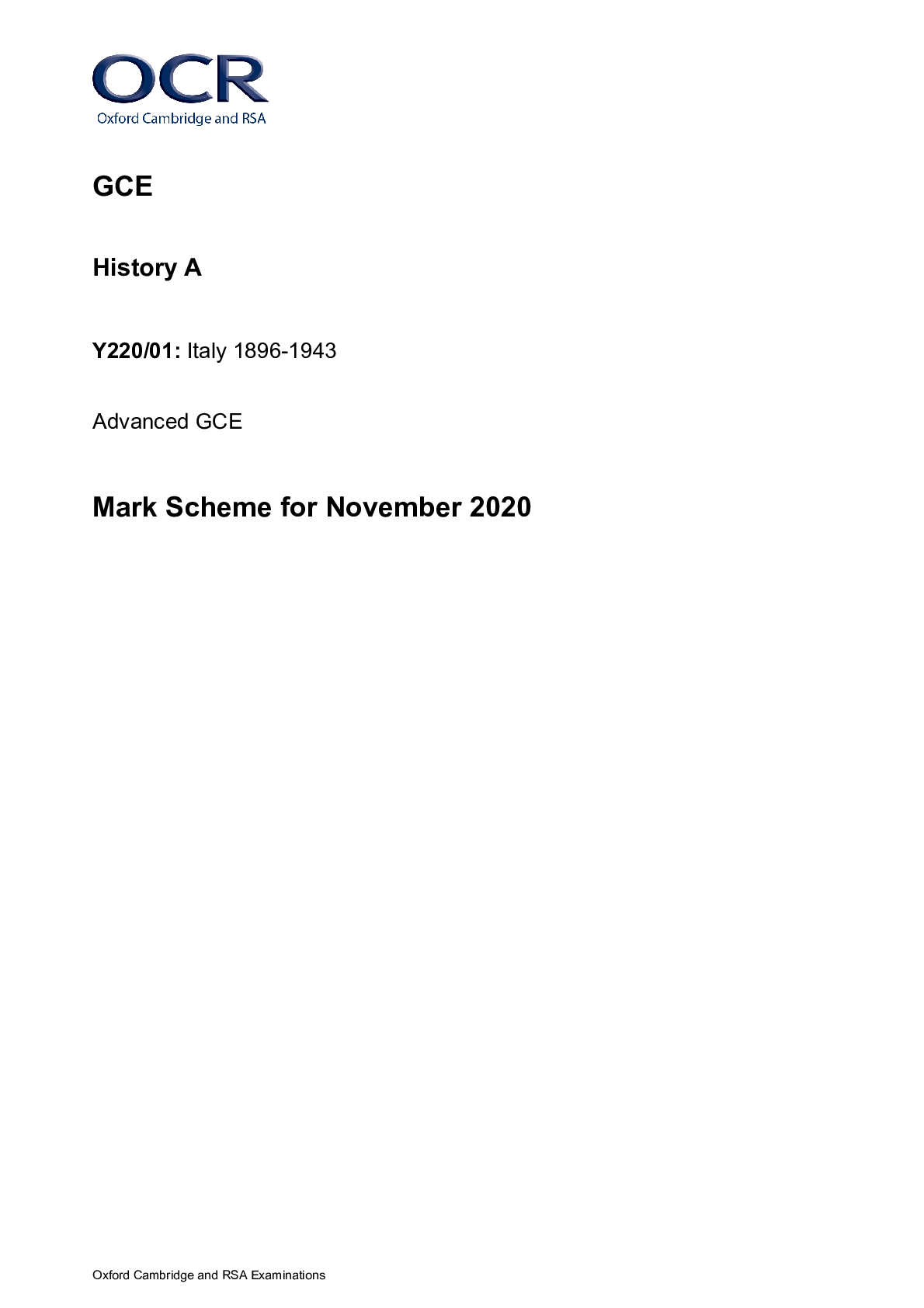
Reviews( 0 )
Document information
Connected school, study & course
About the document
Uploaded On
Jul 17, 2022
Number of pages
12
Written in
Additional information
This document has been written for:
Uploaded
Jul 17, 2022
Downloads
0
Views
33


.png)
